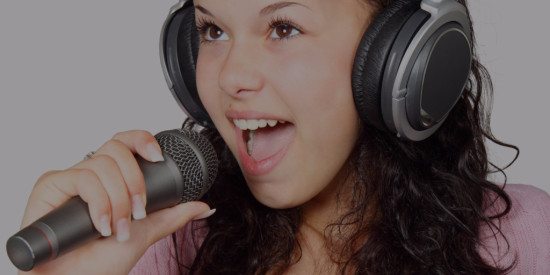Whilst you need to have a broad music vocabulary so that you can answer questions on any aspect of the topic, it’s a good idea to pay particular attention to words and phrases related to your favourite genre of music. There are just so many different types and styles of music that it would be poor use of your study time to try and learn vocabulary for them all.
Most of us enjoy listening to music, or even performing ourselves, which makes music questions fairly easy to answer, especially if it’s about your favourite band, singer or song.
The subject of music could come up in any part of the IELTS exam and this list of music vocabulary is equally relevant for Writing, Speaking, Reading and Listening questions.
This page contains over 130 common words and phrases, together with an explanation for each one and a sample sentence to show it in context. This will help you to learn how to use it correctly.
Don’t try to learn them all. Look at my suggestions below as to the best way to use the list.
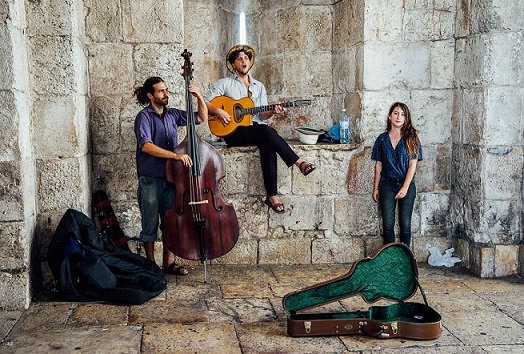
To help you create the best possible answers, I’ve included four things here:
- IELTS-style questions on the topic of music
- Sample answers
- A list of common music vocabulary with definitions & sample sentences
- Links to online reading and listening resources
You’ll find
PDF downloads of both the questions and sample answers and the vocabulary list
at the bottom of the respective sections.
The
questions relate to the Speaking test because this part of the exam offers the
broadest range of possible questions on this topic. They give the best
opportunity for me to demonstrate the vocabulary and for you to practise using
it.
I’ve
included IELTS-style questions and answers for all three parts of the Speaking
test. I’ve highlighted keywords and phrases in bold.
You’ll find
these words and phrases, and many others, in the vocabulary list beneath. There’s
also an audio to listen to the pronunciation.
Finally, at
the bottom of the page, I’ve added links to topical articles, short videos and
podcasts that will help you to improve both your music vocabulary and your
reading and listening skills.
IELTS-Style
Speaking Test Questions and Answers
Common music vocabulary
is highlighted in bold.
Part 1
1) What types of music do you like to listen to?
It depends on what mood I’m in but
generally, I like easy listening
although I am a massive fan
of country music and play
this genre more than any
other.
2) Are there any kinds of music that
you dislike?
I’m not really into jazz. It’s just not my taste in music, especially when
the musicians improvise. It sounds like they are
all playing different tunes
and there’s no harmony.
3) Do you ever go
to music gigs?
I love listening to live music and go to local gigs at least once a month. I only go
to concerts by top bands once in a blue moon as I live a long way from the big music venues.
4) Have you ever been in a music group or a band?
I
was a vocalist in my church
music group for several years
and also sang in the choir
when I was in school.
5) Does your country have a
traditional type of music or dance?
Folk music and Morris dancing are both traditional
in the UK. The music for this type of dancing is often played on the fiddle and accordion, with a drum
to give the dancers a good rhythm
and beat.
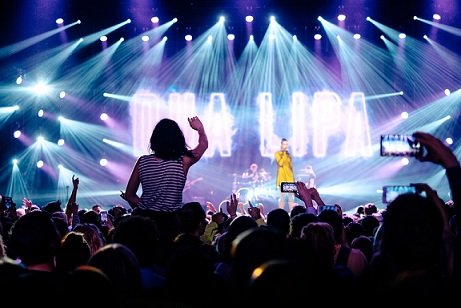
Part 2
Describe your favourite music
group or band.
You should say:
- what group or band is it
- what type of music they play
- how long you have been listening to their songs
and explain why you like this music
group or band.
I
like many different groups but
the one that comes top of my list has to be Bruce Springsteen and the E Street
Band.
I
first heard their music way back in 1980. I had a boyfriend who had one of their
albums and I was a fan from the first track I heard. I’ve been
listening to them ever since. The song
that really hooked me was “The River”. It’s still one of my favourite songs of all time. It has a slow,
haunting melody and beautiful
lyrics.
In
those days, very few people in my country had heard of Bruce Springsteen but
all these years later his band
are often on tour here and they
play sellout concerts around the world. His
nickname is “The Boss” which shows how much people respect him and his great
music.
Although
the E Street Band are essentially a rock
band, there are strong influences of folk, rock and roll, blues
and country in their music
which helps then appeal to a wide audience.
I
was once given two tickets to one of the band’s
concerts at Cardiff Arms Park
rugby stadium; a great venue. They were a Christmas present and I took my sister along with
me. It’s the only time I’ve seen them at a live
gig but it’s an event I shall never forget. What a wonderful experience.
We sang along to all the songs.
The
highlight of the show was when they performed “The River. At the end, the band stopped playing and Bruce
led the audience in singing the
chorus over and over again.
It was amazing and a very special moment. I actually found it quite moving as
that was the song that had
started me as a fan all those
years ago and there I was singing it with him. There was silence when it
finally ended and then the applause
started and went on for what seemed like forever.
It’s
hard to put in words why I like Bruce Springsteen and his band so much. I think it’s because their lyrics are so real while most of
the songs have a strong melody that stirs your soul. That’s
the best way I can put it.
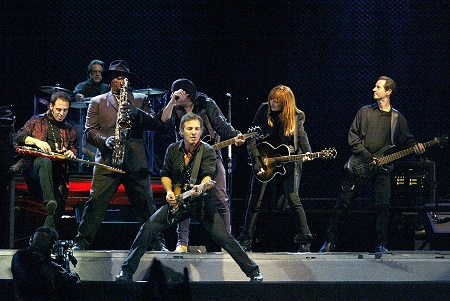
Part 3
1) Is it important to listen to
music with other people?
I think that listening to
music can be both a social experience and a personal one. Young people in
particular like chilling out
with friends while listening to their favourite tracks. There’s also something special about attending a live gig with your mates and singing along to the familiar tunes with all the other fans.
I’ve only ever been to a
couple of music festivals but
what I remember as much as the bands and
the fantastic music was the atmosphere of the events and that was created by all
the people who were there.
On the other hand, you can
enjoy music just as much when listening on your own. The fact that everywhere
you look there are people walking around wearing earphones or headphone
seems to be proof of this. So, in conclusion, I would say that while it’s nice
to share music with others, it’s not especially important.
2) Why
do you think older and younger generations prefer different types of music?
That’s
something I’ve never really thought about but I suppose it’s because they grew
up listening to different types of music as styles change over time.
Speaking
for myself, there are many talented new bands
and singers that I enjoy listening to. I often buy their albums and download
them onto my MP3 player, but
there’s nothing quite like the music I loved when I was in my teens. Perhaps it’s
as much to do with the memories it brings back as the music itself.
That’s
how I see it and I guess that many other people probably feel the same.
3) Do you think that music should
be a compulsory subject in schools?
I
do believe that music should be taught in schools. This is for several reasons.
Firstly,
it’s important to develop children’s creativity and music is a great way to do
this. They should be encouraged to learn to play a musical instrument, but it’s valuable if they just enjoy learning
and singing a few songs
together.
Secondly,
making music is an excellent way of teaching youngster how to work together in
a fun way and most of them enjoy performing to their friends.
Finally,
most schools put on concerts
and other musical performances. Taking part in these gives children confidence and
they are an important part of the curriculum.
While
older children may drop the subject for exams, having school choirs and orchestras provides
other opportunities for them to continue their interest in music.
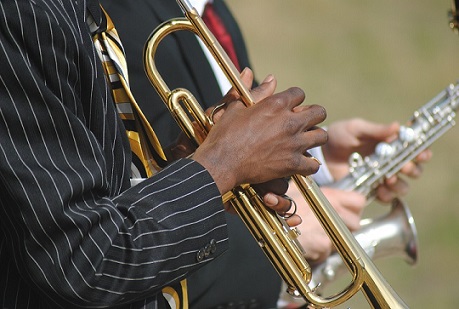
Click this link to get a PDF download of these practise questions & sample answers.
Download PDF Now
Music Vocabulary
* Important
- Do not try
and learn this list of music vocabulary.
- Identify
the vocabulary you find useful for answering practise questions about this topic.
- Record
these in your vocabulary notebook and practise using them regularly.
I recommend that you create
your own answers to the Speaking questions on this page. You will find many
other IELTS-style practise questions by searching online.
For help on how to learn
vocabulary, what to learn and how to record it, visit these pages:
How to Learn Vocabulary for
IELTS
Top 6 Types of IELTS
Vocabulary & Topic Word Lists
Music Vocabulary – Common Words & Phrases
Music Vocabulary Set 1: Key definitions
Set 1: Music genres
There are
many different styles of music around the world. These are some of the
mainstream genres but do add others to your own music vocabulary list if there
are particular styles you like that aren’t included here.
music genre – a distinct type or style of music
— My favourite music genre is rap.
pop – popular music; music liked by a
broad range of the population
— Pop songs are enjoyed by lots of different types of people
because they have a good rhythm, a catchy melody, and are easy to remember and
sing along to.
rock music
– music that is based on amplified instruments, especially the electric guitar
and electric bass, and characterized by a strong bass line and strong rhythms
— The Rolling Stones play some of the
best rock music ever written.
heavy metal – a type of highly amplified
harsh-sounding rock music with a strong beat, characteristically using violent
or fantasy imagery
— I like some rock music but find heavy metal a bit too loud.
rap – a
type of music in which the words are not sung
but are spoken in a rapid, rhythmic way
— Whilst I’m not a great fan of rap music, I do think it’s amazing how they speak so fast and
remember the words.
country music – a
form of popular music originating in the rural southern US. It is a mixture of
ballads and dance tunes played characteristically on fiddle, banjo, guitar, and
pedal steel guitar.
—
There’s a great country music venue
in my town where everyone dresses up as cowboys when they go to gigs.
jazz – a style of music that is generally
loud and rhythmic, where the musicians often make the music up as they go along
—
Louis Armstrong is still a popular jazz
musician many decades after his death.
reggae – a form
of music with a distinct beat that originated in Jamaica and is still
associated with the Caribbean
— Bob Marley was the first internationally known reggae musician.
blues – African-American
music that expresses grief or sorrow about injustice and a longing for a better
life
— Did you know that the blues
is named after the expression ‘to feel blue’ which means to be sad or
depressed?
Music Vocabulary Pronunciation
traditional music – songs and tunes particular to a country or region which have been performed over a long period of time, usually several generations
— Traditional music is part of our culture and should be preserved.
folk – traditional music which included
songs written a long time ago and new songs written in the old style
—
We have some talented young folk
musicians in my country who love performing songs from the old days and writing
new folk songs for our generation.
classical music – a form of music developed in Europe mainly in the 18th and 19th centuries by musicians highly skilled in musical composition
— I find that classical music
really stirs up the emotions and I particularly enjoy listening to Beethoven and Bach.
opera – a
musical play, often very dramatic, in which most of the words are sung
— I’m not a fan of opera
as I really don’t like the style of singing.
musical – a play or film that
uses singing and dancing in
the story but also includes a lot of spoken dialogue
— Although there are lots of great new musicals being written, I still love West Side Story the best.
instrumental music – music where you
just hear instruments playing and there is no singing
— I’m not happy when they play instrumental music on my favourite
radio station as I like to be able to sing along the lyrics.
easy listening
– a type
of music that is not complicated, is pleasant to listen and doesn’t need much
of your attention
— When I
get home in the evening I put on some easy
listening to help me relax after a busy day.
background music – music that is playing while something else is happening
— My friend likes to have background music on while she’s
studying but I need a quiet place to work.
Music Vocabulary Pronunciation
Music Vocabulary Set 2: Musical instruments & playing music
If there are any traditional musical
instruments popular in your country that you might want to talk about, add them
to your own music vocabulary list.
instrument – something you play to make music
Some common instruments:
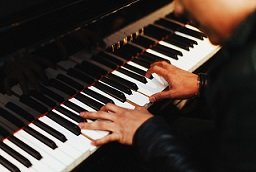
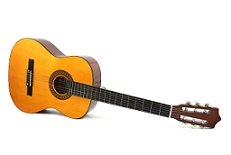
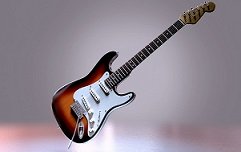
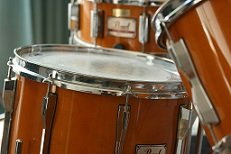
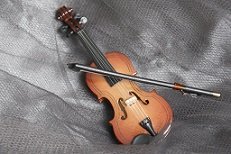
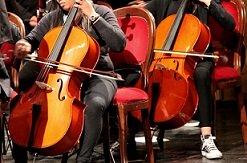
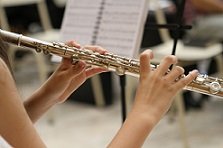
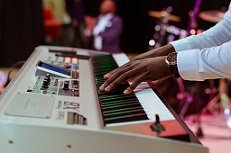
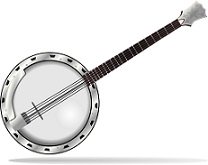
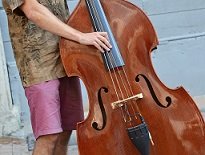
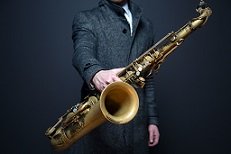
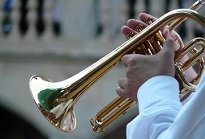
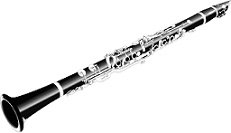
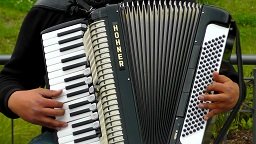
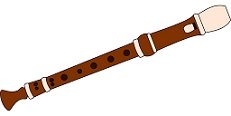
Music Vocabulary Pronunciation
traditional
instruments – a type of instrument that
has been played for many generations or that was popular in the past,
often unique to a country or region
— A sitar is a
traditional Indian musical instrument.
to take up (a musical
instrument) – to
begin learning a musical instrument
— I’m going to take up the guitar.
to read music – to understand and follow written
musical notes
— I’m so glad I learnt to read music when I had piano lessons as
a child because it really helps me now that I sing in a choir.
to play by ear – to play without reading the
musical notes
— Many talented musicians can’t even
read music and only play by ear.
talented
– to be naturally skilled at something
—
I never got the hang of playing an instrument even though both my
parents are talented musicians.
to
be musical – have a
skill in or a great liking for music
— My friend Sally is very musical and can play several different
instruments.
self-discipline – the ability to make yourself do things you know you
should do even when you do not want to
— You need
a lot of self-discipline to learn
the piano as you have to practise every day and play boring scales.
sense
of accomplishment – to feel
like you’ve achieved something you can be proud of
— Bernie
felt a real sense of accomplishment
at passing his Grade 2 flute exam.
vocals – a part of a piece of music that is sung
— My parents met in a band. Dad was a guitarist and Mum sang vocals.
Music Vocabulary Pronunciation
Music Vocabulary Set 3: Musicians
musician – a person who plays a musical instrument, especially as a
profession, or is musically talented
— It was Jai’s ambition to be a professional musician and play in a famous
orchestra.
bass player
– someone who plays the bass
conductor
– the person who leads the orchestra
guitarist
– someone who plays the guitar
keyboard player
– someone who plays the keyboard
pianist
– someone who plays the piano
drummer
– someone who plays the drums
cellist
– someone who plays the cello
violinist
– someone who plays the violin
vocalist
– someone who sings
— Phil Collins was unusual in being both the drummer and lead vocalist in a band, the famous Genesis.
choir
– a group of singers singing together
— Lulu really enjoyed singing in the choir, especially when they performed at concerts.
orchestra – a large group of musicians who play many
different instruments together and are led by a conductor
— Jason was delighted when he was asked to play violin in
the school orchestra.
band – a group of people who
sing together and also play instruments
— I was so excited to be asked to play
bass guitar in the new band.
group – a collection of people
who sing together but do not necessarily play instruments
— All the groups performing
in the contest were excellent and it was hard for the judges to pick the best.
composer
– a
person who writes music, especially as a professional occupation
— My favourite classical composer is Mozart.
Music Vocabulary Pronunciation
Music Vocabulary Set 4: Live music
a performance
– the act of entertaining other people by dancing, singing, acting or
playing music
—
The choir gave a wonderful performance at my sister’s wedding.
a gig
– a performance of a band
— My new band is playing their first gig at the weekend.
a show
– a performance,
especially involving music
— I’m
going to my kid’s school this evening to watch them perform in a show.
live
music – music
performed in front of an audience
— We have many clubs in my city and
I often go along with friends to listen to live
music.
Collocations:
- live show
- live
performance - live gig
music festival – an organized event, typically lasting several days, featuring
performances by various musicians, singers and groups
— I try to go to at least one music festival each summer.
concert – a performance of music by one or more
musicians or singers
— My orchestra is going to perform at a concert organized to raise money for charity.
stage
– a raised platform on which musicians, actors or entertainers
perform
— I felt nervous when I walked out on stage and saw the large audience waiting to hear me sing.
venue – the place
where a public event such as a concert happens
— The disused warehouse was
the perfect venue for a rock
concert.
Music Vocabulary Pronunciation
Music Vocabulary Set 5: Recorded music
recording / recorded music – music that has been
stored on a record, CD, computer, etc., so that it can be heard again
— I
have recordings of many of my
favourite bands stored on my computer.
MP3
player – an electronic device that can store and play digital audio files
— I always carry my MP3 player with me so that I can listen
to music whenever I want to.
headphones
/ earphones – an electronic device that fits over or in the ears for
listening to music
— I wear earphones
to listen to music on my MP3 player while I’m out jogging.
album – a collection of recordings issued as a single item on
CD, record or another medium.
— I can’t
wait for my favourite band’s new album
to come out.
to download tracks – to obtain music from the internet
— I heard a great band at the gig
last night and I’m going to download
some of their tracks.
speakers
– a piece of electrical equipment for playing recorded sound, through which the sound is played
— The jazz album I got for my
birthday sounds amazing
through my new speakers.
Music Vocabulary Pronunciation
Music Vocabulary Set 6: Describing music &
songs
a song
– a
usually short piece of music with words that are sung
— My favourite Ed
Sheeran song is “Thinking Out Loud”.
lyrics – the
words to a song
— Leonard Cohen wrote some
of the best lyrics of all time and
many artists still perform his songs today.
a melody – the main tune in a piece of music that is often played or sung more than once
— I had
trouble picking up the melody of the
new piece we started learning at choir rehearsal today and will practise it at home.
a tune
– the musical part of a song, especially one that
is pleasant and easy to remember
a catchy tune – a tune or a song that’s easy to
remember and stays in your mind so that you find yourself humming or singing it
— I heard a really catchy
tune of on my kid’s TV programme this morning and I’ve been humming it all
day.
piece of music – a musical composition, especially but not necessarily an
instrumental one
— My piano teacher has given me a
new piece of music to learn before
my next lesson.
taste in music – the music someone likes
— My boyfriend and I have the same taste in music and go to live gigs
whenever we can.
rhythm
– a regular, repeated pattern of sounds
— I love the rhythm of
reggae music.
beat
– a characteristic
rhythm in some types of music
— Rap music has such a distinctive beat.
harmony – a pleasant musical sound made by different notes being
played or sung at the same time
— One of
the reason I enjoy country music so much is because many songs have lovely harmonies.
Music Vocabulary Pronunciation
to be out of tune – to play or sing slightly wrong notes
— My dad likes to sing along the radio but is so out of tune that it sounds terrible.
to be in tune – to play or sing with the correct pitch
— Before the performance, the guitarist tightenend the strings of his guitar so that it was in tune.
to have a great voice – to sing well
— I think my friend should enter the singing competition as she has a great voice.
to be tone deaf – to be unable to distinguish the different notes in music
— I’d really like to able to sing but I’m tone deaf so I don’t think there’s much chance.
chorus – a regularly repeated line or group of lines in a song
— The choir sang lots of well-known songs and encourages the audience to sing along to the choruses.
upbeat – cheerful or lively
— If I’m feeling sad I put on some upbeat music and feel better almost at once.
nursery rhyme – a simple traditional song or poem for children
— I can still remember many of the nursery rhymes I learnt as a child.
lullaby – a quiet, gentle song sung to send a child to sleep
— If my baby wakes up in the night I just sing him a lullaby and he soon goes back to sleep.
sing to sleep – to make someone feel sleepy by sing them a gentle song
— My mum used to sing us to sleep when we were young.
Music Vocabulary Pronunciation
Music Vocabulary Set 7: Music & the emotions
passionate –
to feel strongly about something
— I’m passionate about playing the saxophone.
to cheer
up – to cause to feel better
— Upbeat music always cheers me up if I’m feeling down.
relax / chill
out – to become less tense or
anxious
— After a stressful day at
work, I lie in the bath listening to classical music as this helps me to chill out.
energise
– to
make someone feel energetic or eager
— Reggae music energises me so that’s what I Iisten to
when I feel sluggish and need motivating.
Music Vocabulary Pronunciation
Music Vocabulary Set 8: Other music vocabulary
rock band – a group of musicians that play rock
music
— One of the great things about
living in Manchester is that all the top rock
bands perform here.
pop star – a famous singer or musician who performs
pop music
— Many teenagers have the dream of
being a pop star as they want to be rich and famous.
famous – known about and recognized by
many people
— The Beatles are one of the most famous bands ever to have existed.
frontman –
lead singer of a band
— Roger Daltrey has been the frontman of The Who for over 50 years.
fan – a person who admires, supports or follows a person, band or team
— I’ve always been an Elvis Presley fan even though he died before I was born.
huge
following – to have a large number of fans
— Modern pop stars have a huge following
which they communicate with on social media.
to go on tour – to go on a planned series of performances around a region
or country
— I hope my favourite band go on tour again soon as they put on an
amazing live show.
sellout – a performance or sports event for which
no more tickets are available because it’s so popular
— The Bruno Mars concerts were a sellout at every venue on the tour.
record company
– a business that makes and sells musical recordings
— Our band
is getting well-known across the country and we’re hopeful of getting signed by
a record company.
record label
– a brand or trademark associated with the marketing of music recordings and
music videos
— You know you’ve hit the big time if you get signed up with
one of the big record labels such as
Sony.
hit the big time
– to become successful and/or famous
— After winning the TV talent show, Shelley hit the big time and was soon singing
in huge venues around the world.
a hit – to be popular; a record that sells lots of copies
— “Happy” was a massive hit for Pharrell Williams.
Music Vocabulary Pronunciation
the charts – a list of individual songs or musical performances ranked in order of number of sales or downloads over a specific period of time which indicates their popularity
— Ariana Grande’s new record is brilliant and I’m not surprised it’s made it to No.1 in the charts.
to sing along to – to join in singing
— My favourite songs in the charts are always the ones you can sing along to.
a sing-song – to sing informally, often with other people
— I have wonderful memories of my gran playing popular songs on the piano at family get-togethers and everyone joining in for a sing-song.
music-lover – someone who really enjoys listening to music
— I can’t say I’m a great music-lover although I do enjoy listening to the radio when I’m driving.
applause – approval or praise expressed by clapping the hands together
— The applause continued even after the band had left the stage.
- a round of applause – an outburst of clapping from an audience to show approval
— The audience gave the choir an enthusiastic round of applause as they came on to perform.
to be into / not into – to be interested in or involved with / to not be interested in
— I’m really into folk music but not into jazz at all.
to improvise – create and perform music, drama or verse spontaneously or without preparation
— I don’t enjoy listening to jazz when it’s improvised as it sounds like the musicians are all playing different tunes.
once in a blue moon – hardly ever
— I’m definitely a music-lover but only go to live gigs once in a blue moon.
Music Vocabulary Pronunciation
Click this link to get a PDF download of this list of music vocabulary.
Download PDF Now
Ways to Improve Your Music Vocabulary
One of the best
ways to improve your music vocabulary is through reading. Watching topic related YouTube
videos and listening to podcasts is also hugely beneficial.
Here are some
online resources I recommend.
Music Articles
These online publications contain music news and related articles. Most music genres have their own publications so search for those that particularly interest you, e.g. «Jazz magazines» or «Jazz articles».
Pitchfork
BBC News — Music
The Guardian — Music
TED Talks
I love TED Talks. They are short videos
with a powerful message and are generally very interesting. They’re ideal for
improving your vocabulary and give valuable listening skills practise.
Search TED Talks — Music to help you improve your music vocabulary. It will take a bit more searching to find something relevant than with some other topics but it’s worth seeing what you can find.
All Topic Vocabulary
Like this page?
-
Home
-
IELTS Vocabulary
-
Music Vocabulary
›
›
-
Back To Top
Английская лексика на тему музыки
1. Questions about music
Do you like music? — Вы любите музыку?
Can you play any instrument? — Ты умеешь играть на какому-нибудь инструментах?
Do you like singing? — Ты любишь петь?
What is your favourite type of music? — Какая ваша любимая музыка?
What genre of music do you listen to? — Какой жанр музыки ты слушаешь?
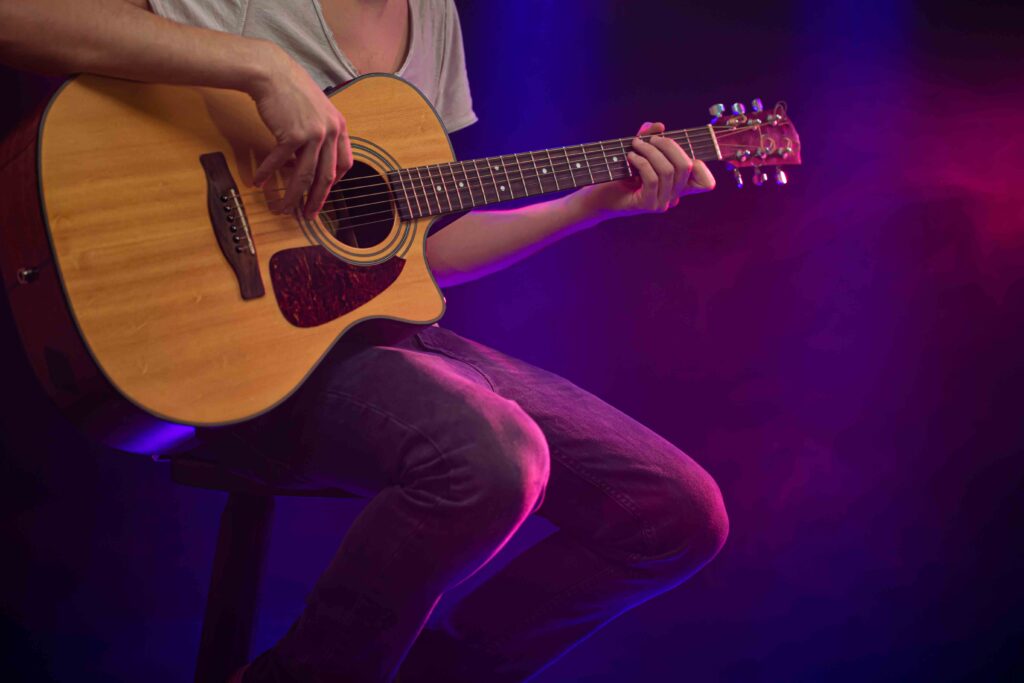
2. Actions
to sing along
to sing karaoke
an earworm — навязчивая мелодия
It’s just an earworm. — Это просто навязчивая мелодия.
to get stuck in your head
to have taste in music — иметь вкус к музыке
to be tone deaf — медведь на ухо наступил (быть глухим)
set my favourite song as a ringtone — установить мою любимую песню в качестве мелодии звонка
to own a lot of vinyl — иметь много виниловых пластинок
to own a lot of records — иметь много записей
to own a lot of physical albums — иметь много альбомов (физических альбомов)
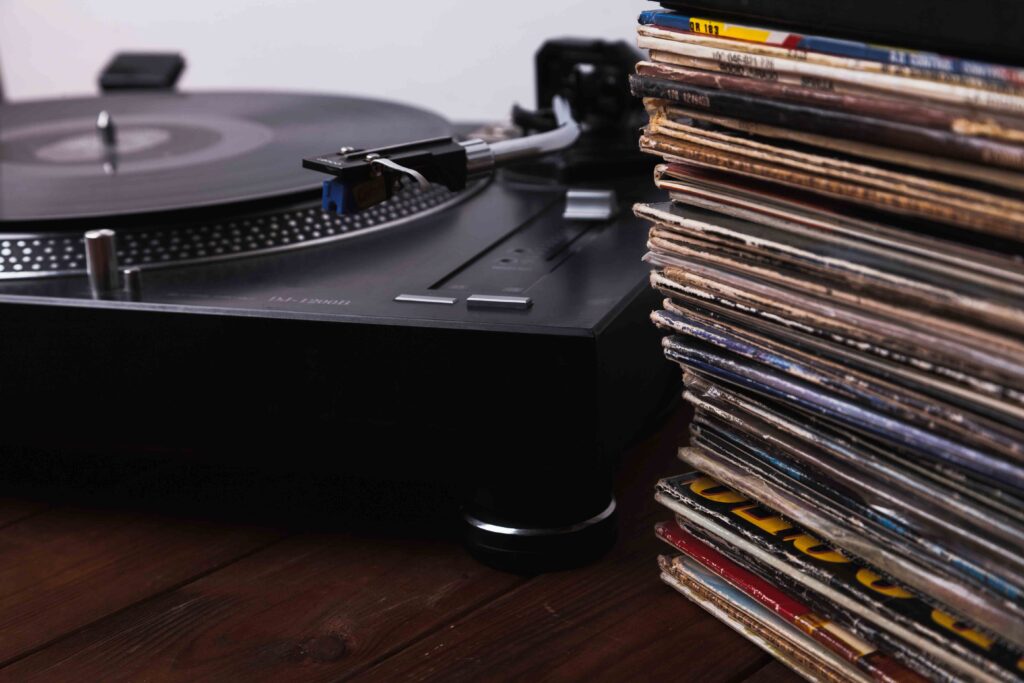
3. Words to describe the type of music
fast tempo — быстрый темп
The song is so upbeat.
a complex song — сложная песня
heavy music — тяжелая музыка
loud music — громкая музыка
relaxing music — расслабляющая музыка
soft music — мягкая музыка
piercing music — пронзительная музыка
hurt your ears — навредить твоим ушам
rhythmic music — ритмичная музыка
uplifting music — воодушевляющая музыка
melancholic music — меланхолическая музыка
catchy music — запоминающаяся музыка
lively music — живая музыка
harmonic music — гармоническая музыка
make you fell better (happier) — делать тебя счастливее, чувствовать себя лучше
It has a pleasing melody. — У него приятная мелодия.
That sounds awful. — Это звучит ужасно.
It makes my ears hurt. — У меня болят уши.
That’s too much of noise than music. — Это шум, а не музыка.
It heals. — Она исцеляет.
It stirs up my imagination. — Она будоражит мое воображение.
It’s rejuvenating. — Она делает моложе.


4. Концерты
a concert — концерт
a gig — концерт
live show — прямой эфир

5. Люди
a musician — музыкант
a band — музыкальная группа
women performers — женщины-исполнители
a vocalist — вокалист
a singer — певец
an artist — исполнитель
a music lover — любитель музыки
a music buff — любитель музыки
a music expert — музыкальный эксперт
to pick certain tunes — выбирать определенную мелодию
to develop a deeper understanding of music — развить более глубокое понимание музыки
to explore different genres of music — исследовать разные жанры музыки
an album — альбом
a record — запись
vinyl — виниловая пластинка
a vinyl lover — любитель виниловых пластинок
CD
physical music
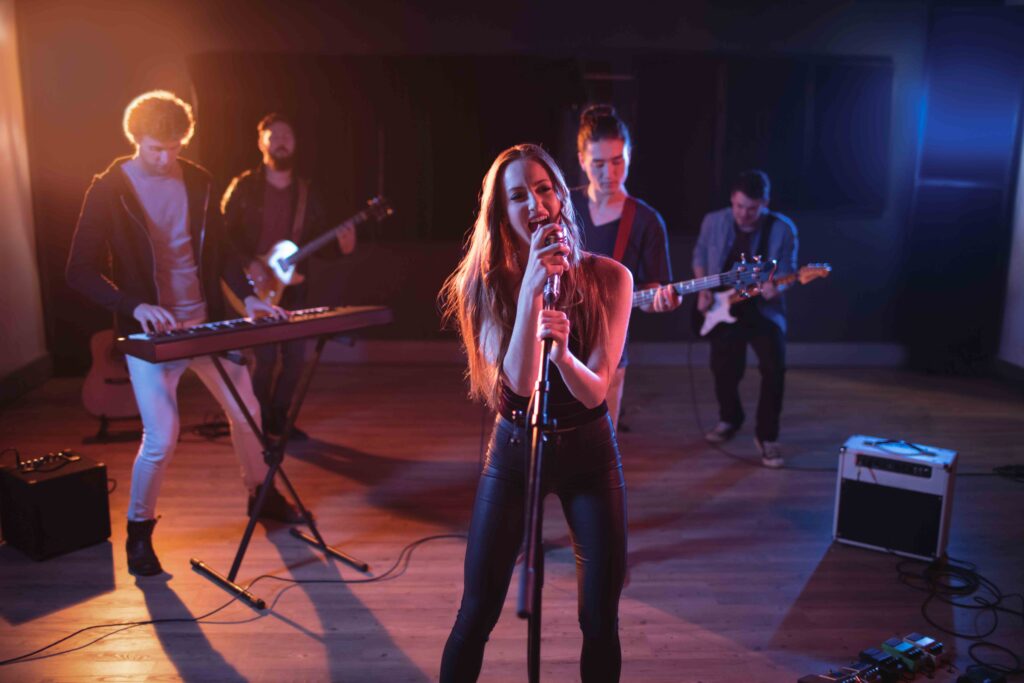
6. Составляющие музыки
a tune — мелодия
to play a tune — сыграть мелодию
rhythm — ритм
a good track (song) — хороший трек (песня)
catchy beat — запоминающийся ритм
to like a beat of that song — любить ритм этой песни
fast tempo — быстрый темп
slow tempo — медленный темп
the sense of rhythm — чувство ритма
a downtempo song — тихая (спокойная) песня
7. Успех
a record label — звукозаписывающая компания, студия звукозаписи
a small record label — небольшая студия звукозаписи
to have a massive hit — иметь огромный успех
to have a huge (giant) following/fan base — иметь огромную (гигантскую) базу подписчиков / фанатов
to getting signed by a record label — подписать контракт с лейблом
Many girls are head over heels in love with him. — Многие девушки по уши влюблены в него.
head over heels — по уши
8. Top 10 genres of Music Industry
8.1. Electronic Dance Music — Электронная танцевальная музыка
be produced by DJs
add dozens of tones to a piece to create unique music
hear them in clubs
was known in the form of Jamaican dub music
8.2. Rock Music
has been rocking the world since the 1950s
started actually around string instruments
Its loud and strong beats make it popular among the youths.
Rock bands:
Metallica, Pink Floyd, Nirvana, The Doors
8.3. Jazz
has its roots both in the West African and European culture
Originating in the late 19th to early 20th century.
Women performers:
Ella Fitzgerald, Betty Carter, Abbey Lincoln and Ethel Waters
8.4. Dubstep — Дабстеп
falling in the electronic music genre
8.5. Rhythm and Blues — Ритм-энд-блюз
Vocalists:
Rihanna, Mariah Carey, Beyoncé, Usher and the legendary Michael Jackson
be a combination of hip hop, funk, dance, pop and soul focusing on themes like relationships and freedom
8.6. Techno — Техно
the use of technology today has greatly enhanced the quality of techno style music and popularizing it among people day by day
8.7. Country Music — Кантри-музыка
to be a popular genre of American music which originated in the 1920s
having its roots from American folk and western music
using simple forms of instruments ranging from electric and steel guitars to drums and mandolin or mouth organ
Music singers:
Kenny Rogers, Shania Twain, Johnny Cash Taylor Swift
8.8. Electro — Электро
It is a blend of hip hop and electronic music. — Смесь хип-хопа и электронной музыки.
using a drum machine, vocoder and talkbox
Notable artists who have been into this form of music:
Arthur Baker, Freeez, Man Parrish and Midnight Star
8.9. Indie Rock — Инди-рок
It was originated in the 1980s and has gradually changed the music industry.
8.10. Pop Music — Поп-музыка
This form can include any form of music ranging from urban and dance to rock, country and Latin.
Instruments highly used are electric guitars, synthesizer drums as well as bass.
8.11. Classical Music
J.S. Bach — St Matthew Passion
Tchaikovsky — Symphony No. 6
Beethoven — Grosse Fuge
Mozart — Requiem
8.12. K-pop
Kpop is Korean popular music.
9. Types of musical instruments
9.1. Percussion instruments — Ударные инструменты
the piano, the xylophone, the cymbals
9.2. Wind instruments — Духовые инструменты
the saxophone, the flute, the trumpet, the clarinet
9.3. Stringed instruments — Струнные инструменты
the guitar, the violin, the cello
9.4. Electronic instruments — Электронные инструменты
the Xth Sense
9.5. Membranophones — Мембранофоны
Cylindrical drums, barrel drums, hourglass drums
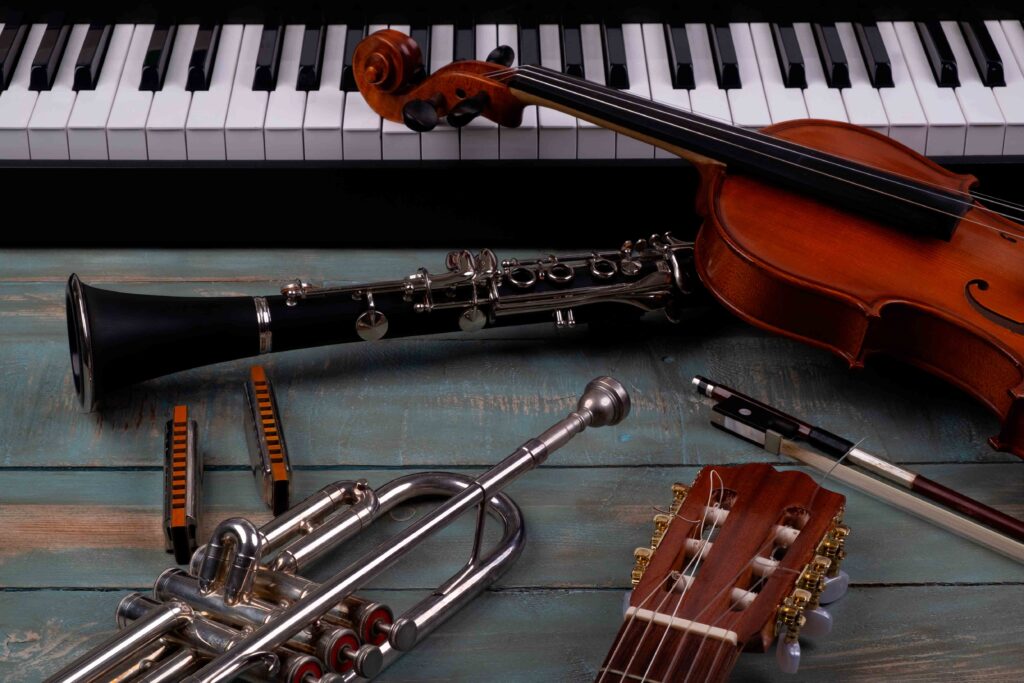
10. Apps for listening to music
Amazon Music (free/subscription)
Spotify (free/subscription)
Apple Music (subscription)
YouTube Music (free/subscription)
Bandcamp (individual purchases)
Shazam (free)
11. Benefits of Learning a Musical Instrument
11.1. Creativity
produce your music out of artistry
11.2. Memory Skills
can help exercise your brain
11.3. Boosts Your Confidence
need to perform in front of your fellow students, teachers, or family and friends
11.4. Coordination Skills
stimulating your brain and body to communicate with your mind, hands, and eyes
11.5. Maths
enhancing the sense of rhythm, beat, and scale. These are critical factors that stimulate your problem-solving skills.
11.6. Improved Academic Achievements

Репетитор английского языка
Writing about music? Discover comprehensive words and phrases to describe music of all genres.
- Music Adjectives
- Music Nouns
- Music Verbs
- Musical Instruments
- Music Styles
- Music Phrases
- accessible
- accomplished
- ambitious
- assured
- bangin’
- beautiful
- blissful
- bold
- breathtaking
- brilliant
- catchy
- cerebral
- classic
- clean
- clever
- cleverly-written
- cohesive
- complex
- conceptual
- danceable
- definitive
- deftly-produced
- delightful
- dynamic
- ebullient
- eclectic
- ecstatic
- effortless
- emotionally-rich
- endlessly-playable
- enigmatic
- enterntaining
- epic
- ethereal
- exceptional
- exhilarating
- expansive
- notable
- nuanced
- number
- operatic
- passionate
- percussion-saoked
- perfect
- piercing
- playful
- poetic
- poignant
- polished
- primal
- progressive
- radical
- raw
- refined
- refrain
- relentless
- reliably-solid
- reverbed
- rhythimic
- riotous
- riveting
- rollicking
- satisfying
- saturated
- sculptural
- seductive
- sensitive
- skilled
- skillful
- soaring
- solid
- sombre
- sonic
- sophisticated
- feel-good
- finely-calibrated
- flawless
- fluid
- focused
- fresh
- funky
- grandiose
- groundbreaking
- harmonic
- harmonically-rich
- headbanging
- heartfelt
- hi-fi
- highly-listenable
- highly-recommended
- hypnotic
- indulgent
- innocent
- instrospective
- instrumental
- intoxicating
- inventice
- invigorating
- inviting
- latest
- layered
- limitless
- listenable
- lush
- lyrical
- masterful
- mesmerizing
- midtempo
- moody
- musical
- mythical
- sprawling
- staccato
- stratospheric
- strident
- striking
- studied
- stunning
- stylish
- stylistic
- sublime
- successful
- surprising
- symphonic
- synthetic
- talented
- tender
- textured
- thrilling
- throbbing
- thunderous
- tight
- timeless
- top-flight
- trademark
- trailblazing
- transcendent
- transporting
- unexpected
- unfied
- unique
- unpredictable
- unsung
- upbeat
- visionary
- vocal
- well-rounded
- well-tooled
- [] solo
- ability
- accompaniment
- achievement
- addictive
- aesthetic
- album
- allure
- ambition
- approach
- arrangements
- artist
- assemblage
- atmosphere
- audience
- ballad
- band
- bandmate
- bassist
- beat
- best effort
- bravura
- brilliance
- cadence
- CD
- chord
- chorus
- classic
- collaboration
- collage
- collection
- composition
- concept album
- context
- craft
- critical praise
- critics
- melody
- microphone
- mosaic
- music
- musical experience
- musicality
- musician
- note
- ode
- orchestration
- pace
- panorama
- passion
- pastiche
- patterns
- performance
- piece of work
- presence
- production
- progression
- pulse
- quality
- quest
- range
- record
- recording
- references
- refrain
- reissue
- release
- rhythm
- riffs
- score
- session
- set
- singer
- single
- deft
- delight
- design
- disc
- discography
- drummer
- duo
- effort
- emotion
- entertainer
- entry
- EP
- fan base
- fans
- finale
- flow
- follow-up
- genius
- genre
- grooves
- guitar riffs
- guitarist
- harmonics
- harmony
- hooks
- hype
- inflection
- influences
- insight
- instrument
- instrumentation
- intimacy
- jam
- layers
- listener
- LP
- lyricism
- song
- song subject
- songbook
- songcraft
- songwriter
- songwriting
- sonic palate
- sound
- soundtrack
- strong showing
- structure
- style
- success
- swagger
- talent
- technical skill
- technique
- tempo
- territory
- thrill ride
- track
- trio
- triumph
- tune
- variety
- vibrato
- vigor
- vision
- vocal range
- vocalization
- voice
- wordplay
- work
- work of art
- world of sound
- accomplish
- achieve
- affect
- beat
- belt out
- bleep
- blend
- breathe life into
- build
- capture
- channel
- clap
- compose
- convey
- craft
- create
- croon
- delight
- lull
- meander
- merge
- mix
- overlay
- overwhelm
- perform
- pick
- play
- play out
- pluck
- produce
- pull off
- purr
- rap
- record
- reinvent
- release
- develop
- dial in
- emote
- emote
- entertain
- expand
- experience
- explore
- flesh our
- flow
- generate
- harmonize
- headbang
- hear
- hone skills
- hypnotize
- improvise
- invigorate
- reveal
- sample
- scat
- seduce
- serenade
- showcase
- sign
- sing
- spin
- strum
- succeed
- tap your feet
- transport
- tune in
- tweak
- venture
- wander
- whistle
- accordion
- baby grand piano
- banjo
- bass drum
- bass guitar
- bell
- bongo drum
- clarinet
- classical guitar
- cymbal
- digeridoo
- mandolin
- oboe
- organ
- piano
- saxophone
- slide guitar
- snare
- sousaphone
- steel drum
- steel guitar
- synthesizer
- electric guitar
- fiddle
- flute
- grand piano
- guitar
- hammond organ
- harmonica
- harp
- harpsichord
- hi-hat cymbal
- horn
- trombone
- trumpuet
- tuba
- turntable
- vibraphone
- viola
- violatta
- violin
- vocals
- xylophone
- acid jazz
- acoustic
- alternative
- ambient
- big band
- big beat
- bluegrass
- blues
- bop
- Britpop
- chill
- Christian
- classic rock
- classical
- college
- contemporary
- country
- inspirational
- international
- jam band
- jazz
- krautrock
- Latin
- lo-fi
- lounge
- metal
- modern
- new age
- oldies
- opera
- pop
- prog/art rock
- psychadelic
- punk
- downtempo
- dub
- easy listening
- electronic
- emo
- folk
- freeform
- funk
- fusion
- gospel
- goth
- grunge
- hard rock
- heavy metal
- hip-hop
- house
- IDM
- ragtime
- rap
- reggae
- rock and roll
- rockabilly
- showtunes
- singer songwriter
- soft rock
- soul
- soundtracks
- surf
- swing
- techno
- top 40
- tropicalia
- urban
- worldbeat
- [] fleshes out her [] melodies with [] arrangements
- [] has created an album that is [] and profoundly []
- [] production touches and [] sound form one of their most [] albums to date
- a [] album packed with [] songs
- a [] sound that will transport you to []
- a [] stab at the world of []
- a [] tour de force
- a []-meets-[] album
- a perfect treasure of [] melodies sung with []
- a step forward in the group’s [] sound
- a stunningly [] debut
- a wholly unique venture
- a work of instrumental genius
- long live the king/queen of []
- melodies that seep into your brain
- memorable [] with quotable lyrics
- music to [] to
- new [] are discovered with each subsequent listen
- one of the better albums of []
- one of the most intriguing [] albums of the year
- proves to be a rousing showcase of the artist’s []
- ready to be your [] soundtrack
- rich in [] and [] complexity/tranquility
- some of the most [] music of their career
- songs that get better with repeated play
- the album is a [], introspective delight
- an album to get lost in
- an instant/soon-to-be classic
- as satisying as it is []
- big [] ballads that show her mastery of []
- blending ancient [] with futuristic []
- combining soaring harmonies with []
- confirming the rumors of the album’s greatness
- each track warrants its place on the album
- embroidered with [] effects
- from start to finish, [] is a total [] romp of an album
- full of lush harmonies and poignant lyrics
- glows with [] qualities/color
- his songs are transformed by []
- the band’s sound is both [] and []
- the bar is raised
- the combination of [] songs and [] superb production make for a very strong album
- the music is [] and [] enough for repeated listens
- the singer’s most [] and compelling expression yet
- the songs are richly textured and []
- their best, most satisfying album to date
- their most [] and [] tp date
- they have easily surpassed the [] of their last album
- with [] bursts of guitar
- written/sung with passion/emotion
|
English vocabulary |
|
|---|---|
| Page 41 of 65 | |
|
➔ Sports and games |
Musical instruments
➔ |
Sound is available for all the English vocabulary on this page — simply click on any word to hear it.
Mobile app
Our award-winning English phrase guide app for Android devices contains over 6000 useful phrases and words with sound.
Support our work
Help us to improve this site by becoming a supporter on Patreon. Benefits include the removal of all ads from the site and access to the Speak Languages Discord channel.
Become a supporter
They say music is a universal language, understood by everyone.
Isn’t that beautiful?
Unfortunately, the same can’t be said about music vocabulary. To understand that, you’ll have to make an effort to learn it!
From different types of music to words that can describe a song, basic music vocabulary can be very useful—whether you’d like to try learning English with music or simply want to chat with a music-loving friend.
In this article, we’ll go through some music vocabulary in English: musical genres, musicians, vocabulary that you can use to discuss music and, of course, lots of examples!
- Musical genres
- 15 terms to talk about music
Start your journey to reach fluency
Musical genres
There are many genres, or types of music, in the world. Here are a few of the most common ones, along with some of the musicians who made these genres famous.
Alternative rock
What it is: A type of music made popular in the 1990s that is derived from rock and includes other musical influences like folk or punk.
Famous artists: Pearl Jam, Nirvana, Radiohead, Weezer, R.E.M.
Blues
What it is: A musical genre created by southern African-American people in the late 1800s, typically expressing hardships and oppression and using instruments like the guitar, harmonica and piano
Famous artists: B.B. King, Muddy Waters, Buddy Guy, Bessie Smith, Freddie King
Country
What it is: A variety of music that originated in the southern and western United States; it includes both slow melodies and dance beats and often incorporates the guitar, fiddle, drums and keyboard
Famous artists: Dolly Parton, Johnny Cash, Tim McGraw, Carrie Underwood, Garth Brooks
Folk
What it is: A type of popular music that uses only acoustic instruments and whose lyrics often involve storytelling; also the traditional music of a certain region (e.g., German folk music)
Famous artists: Bob Dylan, Joan Baez, Joni Mitchell, Simon & Garfunkel, Ani DiFranco
Heavy metal
What it is: A loud, intense style of rock music developed in the late 1960s and early 1970s in the United States and the United Kingdom that uses a strong drum beat and electric guitars
Famous artists: Metallica, Black Sabbath, Led Zeppelin, Slipknot, Tool
Jazz
What it is: A type of music developed in African-American communities in the early 20th century that usually includes piano and brass and woodwind instruments and a lot of improvisation
Famous artists: Miles Davis, Louis Armstrong, Duke Ellington, Ella Fitzgerald, Billie Holiday
Pop
What it is: A general category of music that has widespread commercial popularity; short for “popular”
Famous artists: Taylor Swift, Billie Eilish, Coldplay, Michael Jackson, Justin Bieber
Rap
What it is: A style of music created in New York and popularized in the 1970s whose key features are rhythmic, rhyming speech and the use of slang
Famous artists: Jay-Z, Ice Cube, Kendrick Lamar, Snoop Dogg, Nicki Minaj
Reggae
What it is: A musical style that originated in Jamaica in the 1960s that has a strong second and fourth beat and often expresses political and Rastafarian ideas
Famous artists: Bob Marley and the Wailers, Toots and the Maytals, Shaggy, Ken Boothe, Burning Spear
Rock
What it is: A loud, energetic type of popular music that was developed in the 1950s; aka rock ‘n’ roll.
Famous artists: The Beatles, The Rolling Stones, The Ramones, Queen
Start your journey to reach fluency
15 terms to talk about music
Now that we’ve covered some genres, let’s look at a few adjectives, nouns and verbs that can help you in your musical discussions.
Adjectives
1. Acoustic
Meaning: Describing an instrument or music that doesn’t use electricity to modify its sound (e.g., electric guitar vs. acoustic guitar)
Example: “I love listening to acoustic versions of heavy metal songs.”
2. Catchy
Meaning: Enjoyable and easy to remember
Example: “I tried not to like Justin Bieber, but his music is just so darned catchy!”
3. Chill
Meaning: Easygoing and relaxed
Example: “My favorite kind of music is reggae because it usually has a chill vibe.”
4. Dark
Meaning: Gloomy and depressing
Example: “I love Billie Eilish’s music but I can’t listen to it all the time because some of it feels so dark to me.”
Nouns
5. Tempo
Meaning: The speed at which music is played
Example: “When I’m working out, I need to listen to music with a really fast tempo to keep me energized.”
6. Beat
Meaning: The “pulse” of a song; the basic time measurement of music
Example: “This song always makes me want to dance—it’s got such an awesome beat!”
7. Classic
Meaning: An older song that’s recognized and loved by many people and that can bring up memories and emotions
Example: “I will never get sick of Queen’s ‘Bohemian Rhapsody’ no matter how many times I hear it. It’s such a classic!”
8. Collab
Meaning: The process or result of two or more people working on a project together; a collaboration
Example: “In my opinion, ‘Old Town Road’ by Lil Nas X featuring Billy Ray Cyrus was a really good collab.”
9. Chorus
Meaning: The repeated section of a song (often after every verse); typically the most memorable part
Example: “‘Thinking Out Loud’ by Ed Sheeran has one of the most romantic choruses I’ve ever heard.”
10. Lyrics
Meaning: The words of a song
Example: “Before the internet, we often had to guess the lyrics of a song—and we were often wrong.”
Verbs
11. Blast
Meaning: To play music very loudly
Example: “I have to wake up for work at 5:30 in the morning and my neighbors won’t stop blasting their music.”
12. Hum
Meaning: To make a musical sound with your lips closed
Example: “There’s a guy in my office who hums the same tune all day long; it’s incredibly irritating!”
13. Jam
Meaning: To gather together informally to create music
Example: “Wow, you’re really awesome on the guitar! I play the drums. You should come to my place and jam with me sometime.”
14. Lip sync
Meaning: To move your lips at the same time as a recorded song is playing to make it look as though you’re singing the song
Example: “When I was in the fourth grade, I made up a dance and lip-synced to a Madonna song for a talent show.”
15. Release
Meaning: To make a song or album available for the public to listen to or buy
Example: “I was excited that Drake had released a new album but I found it disappointing—it’s not his best.”
Chat about music with confidence
We hope these music vocabulary words will give you the boost you need to start expressing your musical opinions and knowledge. Review regularly, and it won’t be long before you can speak confidently about all things music!
Start your journey to reach fluency
Andrea is a Canadian freelance writer and editor specializing in English, e-learning, EdTech, and SaaS. She has a background as an ESL teacher in beautiful Vancouver, British Columbia. In her free time, Andrea loves hanging out with her husband and children, creating recipes in the kitchen, and reading fiction. She also loves camping and jumping into lakes whenever possible. Learn more about Andrea on LinkedIn or check out her website.
British people have a real passion for music and love to talk about the latest songs they have heard. As a result, there are many informal ways to talk about music that are commonly used in everyday speech. This article will present and explain 15 informal words and phrases for describing music which you are not likely to find in your English textbooks.
British people have a real passion for music and love to talk about the latest songs they have heard or music they already know and love. However, as a native speaker and teacher of English, I know that there are many informal ways to talk about music that are commonly used. In this article, I present 15 of these informal phrases and words to describe music that are not likely to be in your textbooks. So if you’re looking for music adjectives or words to describe a beautiful song look no further.
Firstly, I am going to introduce informal words for songs, secondly, words for expressing your musical likes and dislikes, thirdly, words related to dancing and music and finally, a quick way to describe music by turning music genre names into adjectives.
Informal Words for Songs
Tune
There are two ways to define tune, the traditional way is as follows: A melody, especially one which characterizes a certain piece of music.
If you use tune in this way you are referring to a part of the song. However, people sometimes will just say “tune” rather than song in everyday speech. The meaning is exactly the same. So when someone says, “I like the new Blur tune” they simply mean, “I like the new Blur song,” referring to the whole song not just a part of it.
Examples:
- The DJ played some great tunes yesterday.
- I heard a great tune on YouTube last night.
Track
Track can also simply be used instead of song. In the days of compact discs, the songs were numbered so you could easily find the song you wanted to listen to. People would say, “Tracks 2, 3 and 5 are good but skip tracks 4 and 7, they’re no good”.
Examples:
- The latest track by Blur is amazing!
- What was that track you just played? I liked it.
Banger
Banger is a word used mostly to describe electronic dance and hip hop music. You can use banger to refer to the latest club tunes. “Hey did you hear the new banger by Daft Punk? It will blow your mind”.
Examples:
- The new Jay Z track is a right banger!
- The Chemical Brothers first album has some bangers on it!
Classic
A song that becomes super popular can be called a classic. However, in everyday speech anyone can call a song a classic. There are no rules. So, if you hear a song and you really like it you can say “That song is a classic!” But be warned, this does not mean that other people will agree with you!
Examples:
- Dylan has got so many classics.
- Bob Marley made some classic records.
- Last night the DJ played all the ‘80’s classics.
Note, classic can also be used when talking about films, books or even experiences as well as music.
Anthem
This refers to a very popular song. In music festivals, when this type of song is played, most of the crowd will know all the words and sing along. If it is a dance track everyone will get up and dance to it. It is very similar in meaning to a classic but there is more of an emphasis on the song being loud and that you would sing along to it or dance to it, kind of like the national anthem, just way cooler.
Examples:
- Oasis has got some anthems.
- The new track by Calvin Harris is going to be a summer anthem.
So now we know there are a few different ways to call a song such as tune, track, banger, classic and anthem. Hopefully, knowing these variations can help you express yourself more like natives and has increased your understanding of musical terms.
Informal Phrases
Next, I am going to introduce five phrases that natives use to express their like or dislike of music( how to say a song is good or not).
Oh my God! That’s a wicked tune!
I remember when I was at school in the ‘90’s, my friends and I started saying wicked as an alternative to cool or great. The old meaning of wicked was bad and was often used like this by the older teachers, “That boy did a wicked (bad) thing”. As young people do, the meaning was changed so when someone says “That was a wicked tune” they mean “That was a cool/great tune”. This a one way that you can use when you don’t know how to describe a song you love.
Why do we say it this way? I guess at first, just to be different from our parents and teachers, and then later it just became a habit.
Examples:
- The Gorillaz is a wicked band.
- The DJ on Saturday will be wicked.
- The club last night was boring. They didn’t play any wicked tunes there.
Lastly, wicked can be used in a non-musical context. So if your friend suggests you meet up and hang out, you can reply, “Wicked, let’s do it!”
What a sick tune!
Have you ever heard someone say “What a sick tune!” and wondered what they meant? Well, they didn’t mean the drummer had thrown up all over the drums and somehow that got recorded onto the final cut of the record. Actually, sick also just means great, cool or amazing. So, next time you hear a song you like on the radio, on YouTube or in the club you can tell your friends, “Wow I just heard a sick tune”. You might also hear people say, “That was the sickest (greatest) thing I have ever heard”.
Examples:
- Goldie has made some sick tunes.
- The Beastie Boys were the sickest.
Just for your notes, skaters or other adrenaline sports junkies might say “Hey, did you see that trick, it was sick!” The meaning is the same: “It was amazing!”
Last night, the band we saw had some killer tunes
For every DJ or band when they go to play a gig they must have some killer tunes to play to their audience. But, what are killer tunes? A simple definition is that these are the DJ’s or bands best songs. But this doesn’t mean that any killing is going to take place! No, it is a metaphor meaning these songs are so good that they cannot be compared to any other songs. They would metaphorically kill off any competition. ( now you know, how to say a song is good)
Examples:
- It was amazing, the DJ played killer tunes all night long.
- They are a good band. But they haven’t got any killer tunes.
Turn it off, it’s too cheesy!
If the music is very simple and without subtlety, and/or the lyrics are corny and obvious (“I will always love you”, “You are my one and only,” etc.) you can say “This music is cheesy”, and accompany this phrase with a pretend sick noise “Urgh” for added effect. Just joking, you don’t need to do this last bit!!
So, when I look back at the music of my youth a lot of times I think, “That music is so cheesy, I can’t believe I liked it!”
It is not all negative though, liking cheesy music can also be a reminder of good times. In this case, you could say, “That music is so cheesy, but I don’t care I love it!”
Examples:
- This music is very cheesy.
- The lyrics are too cheesy.
You can also just say cheese which is simply the noun form.
Examples:
- I can’t listen to this radio station, all they play is cheese.
- The DJ played cheese all night long.
If you need examples of cheesy songs check out; ABBA: “Dancing Queen”, Survivor: “Eye of The Tiger” or anything by the Spice Girls.
It’s not really my thing
If someone asks you, “Do you want to listen to the new One Direction album?” you may instinctively want to reply, “No, I would rather eat a bowl full of broken glass.” But, you don’t want to annoy the person asking, so instead you can use the phrase, “It’s not really my thing”. It has a soft and indirect meaning, but still means no. By saying “not really my thing”, you are being vague as to the reason why you don’t want to listen to the song, therefore avoiding any clash with the other person.
Example:
Friend 1: Do you want to go to a heavy metal gig tomorrow?
Friend 2: Sorry, it’s not really my thing
Again like wicked and classic, this phrase can be used in other conversations such as when talking about films or books.
So those were five informal phrases that can be used to express our likes and dislikes about music. In the next section, I will introduce some words and phrases you can use for music that makes you want to dance. Then the article finishes with a quick and easy way to make adjectives from the names of music genres.
Words and Phrases Related to Dancing:
That groove is amazing!
Oxford dictionaries (2015) define groove as: a particular rhythm in popular or jazz music. In everyday usage, if you listen to a song and the rhythm makes you want to dance, it’s likely that the song has a good groove. So, when your head starts to move in time with the music, or you start to tap your feet you would be, feeling the groove, meaning you are getting yourself into the rhythm of the music.
Examples:
- Great groove on that track.
- We were grooving all night long (verb form meaning: dancing or enjoying the music).
- This rhythm is really groovy (adjective form).
That is a funky tune
What is a funky tune? The definition in the Oxford Dictionary (2015) is: music that has, or uses a strong dance rhythm, in particular that of funk.
Examples of funky music are those made by any funk musician (James Brown, Parliament, George Clinton, etc.) but also some music by pop artists like Madonna. Funk rock bands like the Red Hot Chilli Peppers and dance music such as house and techno tunes can be funky. Generally speaking, when people say music is funky in everyday speech, they are usually just saying this music is good to listen and dance to.
Examples:
- I love to listen to funky tunes.
- Heard anything funky lately?
- The DJ played some funky tunes, we danced all night.
Next Saturday, there’s a wicked rave happening!
So, we have looked at wicked already. It’s just a superlative, a word that makes the thing that follows sound good or special. But, how about the following word, rave?
Well, a rave in today’s language is a large electronic dance music party. When you go to a rave you might hear house, techno, dubstep, drum and bass music, or one of the other many genres of electronic music.
In the late ‘80’s and early ‘90’s in the UK, raves might have been in fields in the summer time, but now they are more likely to be in super modern clubs with superstar DJ’s.
A person that goes to a rave is called a raver, and rave can be used as a verb as well, you can say, “I love raving!” So, next time you go to an all-night party with electronic dance music and DJ’s and you end up dancing all night, yes, you are now a raver!
Examples:
- I’m going raving this weekend.
- I love rave music.
- I was a raver.
Who feels like throwing some shapes?
So, imagine you are having a good time with friends listening to music. Your friend asks you, “Do you want to throw some shapes?” You don’t know what she means. Throw shapes? Surely she doesn’t mean she’s going to get a triangle, a square and a circle out of her pocket and throw them at you, does she?
Well, actually no, what she’s asking you is, “Do you want to dance?” So when someone next asks, “Do you to throw some shapes?” You can reply, “Yes, as a matter of fact I do!!”
Examples:
- We were throwing shapes all night.
- She can really throw some shapes.
- I love throwing shapes.
How to Describe Music: Add a -Y
The last of the fifteen words is not actually a word but a letter: the letter -Y. If you think that describing music is hard, you can just add a -y to the name of the genre and you have made it into an adjective. Then, you are able to describe music in a very simple but effective way.
Here are some examples of how to do this:
- Blues: Bluesy
- Folk: Folky
- Jazz: Jazzy
- Punk: Punky
- Pop: Poppy
Examples in sentences:
- My friend writes bluesy songs.
- I know you like folk music so I got you this CD. It’s very folky.
- Mark plays funky music.
- She likes jazzy music.
- That band last night was kind of punky.
- I like pop music but that is too poppy for me.
Also, I should explain that it is also perfectly fine to say “It was a blues tune, or “It was a funk tune”. By adding the -y, you are saying “The song is a little in the style of blues/pop/folk/jazz” or, “It has something of the blues/pop/folk/jazz about it.”
Lastly, with rock and rap music please be careful as we do not say, “That song is rocky” or, “That is a rappy tune.” Sorry, that’s the English language for you, full of irregularities that you just have to learn.
Summary
Now you’ve read some tips on how to speak about music like natives do. You have additional vocabulary you can use instead of plain song all the time. You can talk about the music you like, and I have introduced a few words related to music and dancing.
Hopefully, next time you have a music conversation, you can participate in the conversation more and also understand a little better what people are saying. Good luck with your language learning, and please get in touch with me if you want English lessons on italki!
Bye!
Image Sources
Hero Image by Jason Eppink (CC by 2.0)
without musical accompaniment
with increasing speed
a diacritical mark used for stress or special pronunciation
musical notation that makes a note sharp or flat or natural
a musical part that supports other musical parts
a portable box-shaped free-reed instrument
slowly
of or pertaining to Aeolus, the Greek god of the winds
in a quick and lively tempo
the lowest female singing voice
increase the volume of
having an output that is proportional to the input
at a moderately slow tempo
the act of adding notes
an elaborate song for solo voice
the manner in which things come together and are connected
characterized by avoidance of traditional musical scales
a decisive manner of beginning a musical tone or phrase
perform in order to get a role
added to or made greater in amount or number or strength
a tubular wind instrument
a narrative poem of popular origin
a theatrical performance of a story by trained dancers
a stringed instrument that has long neck and circular body
musical notation for a repeating pattern of musical beats
the second lowest adult male singing voice
the second lowest brass wind instrument
relating to an elaborately ornamented style of art and music
the lowest part of the musical range
a large drum with two heads
a large drum with two heads
the guitar with six strings that has the lowest pitch
a double-reed woodwind instrument that makes a low sound
the basic rhythmic unit in a piece of music
of or pertaining to a number system having 2 as its base
any of various grasses of the genus Poa
a state of depression
a wind instrument that consists of a brass tube (usually of variable length) that is blown by means of a cup-shaped or funnel-shaped mouthpiece
rudely abrupt or blunt in speech or manner
a brass instrument without valves
the close of a musical section
a solo passage occurring near the end of a piece of music
gradually decreasing in tempo and volume
piece of music in which a melody is imitated in other parts
smooth and flowing
a musical composition for voices and orchestra
a joyful song
a male singer who was castrated before puberty and retains a soprano or alto voice
a large stringed instrument
serious music performed by a small group of musicians
a percussion instrument consisting of a set of tuned bells that are struck with a hammer; used as an orchestral instrument
a chorus that sings as part of a religious ceremony
a stately Protestant (especially Lutheran) hymn tune
a combination of three or more notes that blend harmoniously
a stringed instrument of the group including harps, lutes, lyres, and zithers
based on a scale consisting of 12 semitones
a single-reed instrument with a straight tube
traditional genre of music conforming to an established form
an early stringed instrument like a piano but with more delicate sound
a stringed instrument that has a keyboard
a musical notation written on a staff indicating the pitch of the notes following it
the closing section of a musical composition
someone who writes music as a profession
a musical work that has been created
free-reed instrument played like an accordion by pushing its ends together to force air through the reeds
give concerts; perform in concerts
a composition for orchestra and a soloist
a baroque composition for orchestra and a group of solo instruments
the person who leads a musical group
a Latin American dance of 3 steps and a kick by people in single file
progressing melodically by intervals of a second
a schoolhouse with special facilities for fine arts
a harmonious state of things and of their properties
largest and lowest member of the violin family
the lowest female singing voice
the exclusive right to sell a work
a brass musical instrument with a brilliant tone
a simple style of folk music heard mostly in the southern United States; usually played on stringed instruments
a court dance of the 16th century
a gradual increase in loudness
a percussion instrument consisting of a concave brass disk
taking a series of rhythmical steps in time to music
(music) a gradual decrease in loudness
section of a composition where major themes are elaborated
based on or using the five tones and two semitones of the major or minor scales of western music
the articulation of speech to be intelligible to an audience
using or characteristic of computerized technology
reduction by a semitone of any perfect or minor interval
(music) a gradual decrease in loudness
a sound that glides between two vowels in a single syllable
progressing melodically by intervals larger than a major second
disagreeable sounds
(music) the fifth note of the diatonic scale
of or relating to the ancient Greek inhabitants of Doris, to their Doric dialect of Greek, or to their culture
make a monotonous low dull sound
the sound made by beating a drum
two performers or singers who perform together
consisting of or involving two parts or components usually in pairs
the period of time during which something continues
mechanics concerned with forces that cause motions of bodies
a musical note having the time value of an eighth of a whole note
make more beautiful
the aperture of a wind instrument into which the player blows directly
an extra performance in response to audience demand
an extra performance in response to audience demand
a double-reed woodwind instrument similar to an oboe but lower in pitch
a group of musicians playing or singing together
a brief section of a work forming part of a connected series
a short, technical composition for a solo instrument
section of a movement where major musical themes first occur
of or relating to expressionism
a male singing voice with artificially high tones
a provocative Spanish courtship dance in triple time
a short lively tune played on brass instruments
(music) a prolongation of unspecified length on a note or chord or rest
the closing section of a musical composition
a conspicuously marked or shaped tail
guitar music composed for dancing the flamenco
lowered in pitch by one chromatic semitone
a high-pitched woodwind instrument
the traditional and typically anonymous music that is an expression of the life of people in a community
an arrangement of the elements in a composition or discourse
(music) to be played relatively loudly
chiefly a direction or description in music; loud and strong
a direction in music; to be played very loudly
a musical form consisting of a repeated theme
an old formal French dance in quadruple time
a kind of literary or artistic work
great merriment
a rapid series of ascending or descending notes on the musical scale
a genre of evangelical Christian music
dignified and somber in manner or character
a liturgical chant of the Roman Catholic Church
a stringed instrument usually having six strings
a musical note having the time value of half a whole note
a small rectangular instrument into which air is blown
exhibiting equivalence or correspondence among constituents
a free-reed instrument in which air is forced through the reeds by bellows
compatibility in opinion and action
a chordophone with strings between the neck and the soundbox
a musical instrument with strings plucked by plectra
a song of praise, especially a religious song
of or relating to or based on an impression rather than on facts or reasoning
with little or no preparation or forethought
perform without preparation
lacking in harmony
an intervening period or episode
a break during which an activity or event is paused
the act of expressing something in an artistic performance
the difference in pitch between two notes
the act of singing in a monotonous tone
of or pertaining to the ancient Ionians who lived in Attica and related territories, to their Ionic dialect of Greek, or to their culture
genre of American music that developed in the 20th century
a short, catchy, often comic verse or song
a toy wind instrument into which one hums
diatonic scale providing tonal framework for a musical piece
set of levers that can be pressed, as on a piano or computer
slowly and broadly
(music) the seventh note of the diatonic scale
a short line
connecting the notes; in music
a recurring melody in a piece of music
(of tempo) slow
the words of an opera or musical play
(music) a group of notes connected by a slur
a short amusing opera
the magnitude of sound (usually in a specified direction)
a stringed instrument with a pear-shaped body
an Anatolian language
a harp used by ancient Greeks for accompaniment
relating to or being musical drama
suitable for or suggestive of singing
an unaccompanied partsong for several voices
an artist of consummate skill
of a scale or mode
a stringed instrument related to the lute
genre of music written for walking with regular steps
a percussion instrument with wooden bars tuned to produce a chromatic scale and with resonators; played with small mallets
the most outstanding work of a creative artist or craftsman
musical notation for a repeating pattern of musical beats
the third note of a diatonic scale
a musical composition consisting of a series of songs
containing or characterized by a pleasing tune or sound
a succession of notes forming a distinctive sequence
rhythm as given by division into parts of equal duration
a soprano with a voice between soprano and contralto
a soprano with a voice between soprano and contralto
a standard protocol for communication between electronic musical instruments and computers
of a scale or mode
a stately court dance from the 17th century
relating to or expressing the mood of a verb
a particular functioning condition or arrangement
(of tempo) moderate
characteristic of present-day art and music and literature
a musical passage moving from one key to another
consisting of a single melodic line
an unchanging intonation
a theme that is repeated or elaborated in a piece of music
a small bagpipe formerly popular in France
an artistic form of auditory communication
characterized by vocal or instrumental sound
a play or film containing singing and dancing numbers
someone who plays a musical instrument (as a profession)
artistry in performing music
the scholarly and scientific study of music
a notation cancelling a previous sharp or flat
a pensive lyrical piece of music (especially for the piano)
a technical system of symbols to represent special things
a notation representing the pitch and duration of a musical sound
a part of the score that must be performed without change or omission
a part of the score that must be performed without change or omission
a slender double-reed instrument
egg-shaped terra cotta wind instrument with a mouthpiece and finger holes
a musical interval of eight tones
eight performers or singers who perform together
a drama set to music
a short amusing opera
a musical work that has been created
a musical composition for voices and orchestra
a musical organization consisting of instrumentalists
a structure in an animal specialized for some function
something used to beautify
a musical phrase repeated over and over during a composition
orchestral music at the beginning of an opera or musical
make a sweeping movement
(music) an instrumental suite common in the 18th century
a musical composition consisting of a series of songs
devoted to raising sheep or cattle
relating to a pentatonic scale
the act of presenting a piece of entertainment
a short musical passage
a Thraco-Phrygian language spoken by the ancient inhabitants of Phrygia and now extinct—preserved only in a few inscriptions
a direction in music; to be played very softly
a keyboard instrument that is played by depressing keys that cause hammers to strike tuned strings and produce sounds
a keyboard instrument that is played by depressing keys that cause hammers to strike tuned strings and produce sounds
a small flute; pitched an octave above the standard flute
wind instrument whose sound is produced by means of pipes arranged in sets supplied with air from a bellows and controlled from a large complex musical keyboard
the high or low quality of a sound
with a light plucking staccato sound
perform music on (a musical instrument)
the act of reproducing recorded sound
pull lightly but sharply
of or relating to or characterized by polyphony
new and of general appeal
of or relating to postmodernism
the arrangement of the body and its limbs
learn by repetition
music that precedes a fugue or introduces an act in an opera
at a very fast tempo (faster than allegro)
presentation for the stage or screen or radio or television
announcement of what will occur as part of a public event
a movement forward
expand and contract rhythmically
having four units or components
a musical note having the time value of a quarter of a whole note
a musical composition for four performers
a musical composition for five performers
music with a syncopated melody (usually for the piano)
the limits within which something can be effective
repeat an earlier theme of a composition
performance of music or dance especially by soloists
systematic training by multiple repetitions
equipment for making records
a musical instrument that sounds by means of a vibrating reed
a free-reed instrument in which air is forced through the reeds by bellows
part of a song or poem that recurs at regular intervals
timbre characteristic of a certain range of the human voice
let go as from one’s grip
period of European history at the close of the Middle Ages
a repetition of a short musical passage
a song or hymn of mourning as a memorial to a dead person
(music) a dissonant chord is followed by a consonant chord
the characteristic of having a loud deep sound
produce a deep, clear sound
musical notation indicating silence of a specified duration
an interval during which a recurring sequence occurs
a combination of blues and jazz that was developed in the United States by Black musicians; an important precursor of rock ‘n’ roll
gradually decreasing in tempo
a genre of popular music originating in the 1950s
having excessive asymmetrical ornamentation
expressive of or exciting love
a musical form that is often the last movement of a sonata
the place where something begins
a partsong in which voices follow each other
a flexible tempo; not strictly on the beat
a medieval musical instrument resembling a trombone
concerned with religion or religious purposes
spicy sauce of tomatoes and onions and chili peppers to accompany Mexican foods
a single-reed woodwind with a conical bore
a written form of a musical composition
not concerned with or devoted to religion
a musical composition written for seven performers
several repetitions of a melodic phrase in different keys
six performers or singers who perform together
a rhythmical work song originally sung by sailors
raised in pitch by one chromatic semitone
produce tones with the voice
a stringed instrument of India
a musical note having the time value of a sixteenth of a whole note
a musical note having the time value of a sixty-fourth of a whole note
bypass
play smoothly or legato
a small drum with wires stretched across the lower head
the property of giving little resistance to pressure and being easily cut or molded
singing using solfa syllables to denote the notes of the scale of C major
a musical composition for one voice or instrument
a short musical composition with words
the highest female voice; the voice of a boy before puberty
the lowest brass wind instrument
religious song originated by African-Americans in the South
(music) separating the notes
five horizontal lines on which the musical notes are written
a concave percussion instrument made from the metal top of an oil drum; has an array of flattened areas that produce different tones when struck (of Caribbean origin)
cylinder forming a long narrow part of something
a musical interval of two semitones
one section of a lyric poem or choral ode in classical Greek drama
(music) the fourth note of the diatonic scale
the sixth note of a major or minor scale
(music) the seventh note of the diatonic scale
(music) the second note of a diatonic scale
a jaunty rhythm in music
a long and complex sonata for an orchestra
a musical rhythm accenting a normally weak beat
(music) an electronic instrument (usually played with a keyboard) that generates and modifies sounds electronically and can imitate a variety of other musical instruments
a musical notation indicating the fingering to be used
the speed at which a composition is to be played
the adult male singing voice above baritone
having three units or components or elements
the musical pattern created by parts being played together
melodic subject of a musical composition
a musical note having the time value of a thirty-second of a whole note
the distinctive property of a complex sound
rhythm as given by division into parts of equal duration
a musical notation indicating the number of beats to a measure and kind of note that takes a beat
any of various drums with small heads
the distinctive property of a complex sound
articulate or play by using the fleshy organ of the mouth
(music) the first note of a diatonic scale
a three-note major or minor chord
an instrument made of a metal bar bent into a 3-sided shape
a set of three similar things considered as a unit
having three units or components or elements
a brass instrument with a long tube and a U-shaped slide
a singer of folk songs
a brass musical instrument with a brilliant tone
the lowest brass wind instrument
a type of serial music introduced by Arnold Schoenberg
a small guitar having four strings
two or more sounds or tones at the same pitch or in octaves
a repetition of a musical theme in which it is modified
a line of metrical text
the act of moving back and forth rapidly
(music) a pulsating effect in an instrumental or vocal tone produced by slight and rapid variations in pitch
a stringed instrument played with a bow
bowed stringed instrument in the violin family
lively, in music
music intended to be performed by one or more singers, usually with instrumental accompaniment
the sound made when a person speaks
the magnitude of sound, usually in a specified direction
music composed in triple time
the sound made by something moving rapidly
a musical note having the longest time value
a musical interval of two semitones
engraving consisting of a block of wood with a design cut into it; used to make prints
any wind instrument other than the brass instruments
a percussion instrument with wooden bars played with mallets
a musical instrument with strings over a flat sounding board
a fast movement (usually in triple time)
a flexible tempo; not strictly on the beat
a series of notes differing in pitch according to a scheme
a song played outside the house of a love interest
(music) rapid sliding up or down the musical scale
a curved piece of wood used in playing stringed instruments
a short and simple sonata
a musical composition of movements of contrasting forms
a musical form having 3 sections — exposition and development and recapitulation; characteristic of 1st movement of a sonata or symphony
a musical composition of several loosely connected movements
a tremulous effect produced by repetition of a single tone
having or denoting a high range
a clef that puts the G above middle C on the second line of a staff
a clef that puts the F below middle C on the fourth line of a staff
a note that alternates with another note a semitone above it
a succession of notes forming a distinctive sequence
calibrating something to a standard frequency
a musician who is a consummate master of artistry
two performers or singers who perform together
a musician who plays the alto saxophone
a musician who plays the tenor saxophone
any of a family of brass wind instruments that resemble a bugle with valves
any of various drums with small heads
the adult male singing voice above baritone
the lowest adult male singing voice
a large clarinet whose range is an octave below the B-flat clarinet
a tenor clarinet
a clef that puts middle C on the bottom line of the staff
not affiliated with a major recording company
a member of a people with dark skin and hair who speak Romany and who traditionally live by seasonal work and fortunetelling; they are believed to have originated in northern India but now are living on all continents (but mostly in Europe, North Africa, and North America)
German baroque organist and contrapuntist
German composer of instrumental music
prolific Austrian composer and child prodigy
a prolific British baroque composer (born in Germany) remembered best for his oratorio Messiah (1685-1759)
Italian baroque composer and violinist (1675-1741)
prolific Austrian composer who influenced the classical form of the symphony (1732-1809)
Austrian composer known for his compositions for voice and piano (1797-1828)
German musician and romantic composer of orchestral and choral works (1809-1847)
German composer who developed the romantic style of both lyrical and classical music (1833-1897)
German composer of operas and inventor of the musical drama in which drama and spectacle and music are fused (1813-1883)
important Russian composer whose works are noted for their expressive melodies (1840-1893)
composer who was born in Russia but lived in the United States after 1939 (1882-1971)
German romantic composer known for piano music and songs
French composer and pianist of the romantic school
French composer who is said to have created Impressionism in music (1862-1918)
Hungarian composer and piano virtuoso (1811-1886)
Czech composer who combined folk elements with traditional forms (1841-1904)
Italian operatic composer (1813-1901)
Austrian composer and conductor (1860-1911)
French composer of romantic works (1803-1869)
German composer of many operas
Russian composer of ballets and symphonies and operas
Russian composer best known for his fifteen symphonies
Hungarian composer and pianist who collected Hungarian folk music; in 1940 he moved to the United States (1881-1945)
Austrian organist and composer of romantic music (1824-1896)
Italian composer (1526-1594)
Italian composer (1567-1643)
Finnish composer (1865-1957)
French composer and exponent of Impressionism (1875-1937)
English composer influenced by folk tunes and music of the Tudor period (1872-1958)
Russian composer of operas and orchestral works (1839-1881)
Italian operatic composer noted for the dramatic realism of his operas (1858-1924)
English organist at Westminster Abbey and composer of many theatrical pieces (1659-1695)
composer and piano virtuoso born in Russia (1873-1943)
Russian composer of operas and orchestral works
United States composer and musical theorist (born in Austria) who developed atonal composition (1874-1951)
German composer of more than 100 operas (1714-1787)
German neoclassical composer and conductor who believed that music should have a social purpose (1895-1963)
United States composer who developed a distinctly American music (1900-1990)
French composer of music for organ and a member of a family of distinguished organists (1668-1733)
English organist and composer of church music
French composer noted for his experimentalism and rejection of Romanticism (1866-1925)
major English composer of the 20th century
French composer and teacher who influenced a generation of composers (1822-1890)
French composer (born in Italy) who was the court composer to Louis XIV and founded the national French opera (1632-1687)
French composer of operas whose writings laid the foundation for the modern theory of harmony (1683-1764)
German conductor and composer of romantic operas (1786-1826)
British composer of choral and orchestral works including two symphonies as well as songs and chamber music and music for brass band (1857-1934)
Norwegian composer whose work was often inspired by Norwegian folk music (1843-1907)
Czech composer (1824-1884)
Russian composer of orchestral and piano music (1872-1915)
United States composer of avant-garde music (1912-1992)
German baroque composer (1681-1767)
United States composer who incorporated jazz into classical forms and composed scores for musical comedies (1898-1937)
French composer best known for his operas (1838-1875)
Danish composer (1865-1931)
English composer (1902-1983)
Italian composer of operas (1801-1835)
Russian composer (1833-1887)
French pianist and composer (1899-1963)
Austrian composer in Schoenberg’s twelve-tone music system
United States composer (1910-1981)
United States jazz composer and piano player and bandleader
United States jazz musician; noted for his trumpet style
United States jazz saxophonist (1904-1969)
United States clarinetist who in 1934 formed a big band (including black as well as white musicians) and introduced a kind of jazz known as swing (1909-1986)
United States saxophonist and leader of the bop style of jazz (1920-1955)
United States jazz trumpeter and exponent of bebop
United States pioneering jazz trumpeter and bandleader
United States composer who was the first creator of ragtime to write down his compositions (1868-1917)
a United States bandmaster and composer of military marches
a Polish national dance in triple time
United States blues musician who transcribed and published traditional blues music (1873-1958)
United States jazz musician who moved from ragtime to New Orleans jazz (1885-1941)
a short simple song
United States songwriter noted for his protest songs
a rock group from Liverpool who between 1962 and 1970 produced a variety of hit songs and albums (most of them written by Paul McCartney and John Lennon)
English rock star and guitarist and songwriter who with Paul McCartney wrote most of the music for the Beatles (1940-1980)
United States singer and film actor (1915-1998)
United States blues singer (1894-1937)
Jamaican singer who popularized reggae (1945-1981)
United States guitarist whose innovative style with electric guitars influenced the development of rock music (1942-1970)
United States singer who began singing with his four brothers and later became a highly successful star during the 1980s (born in 1958)
United States rock singer whose many hit records and flamboyant style greatly influenced American popular music (1935-1977)
United States rock singer (born in 1931)
bowed stringed instrument in the violin family
United States country music singer and songwriter
the act of melding or melting together
producing distorted sensory perceptions and feelings
the film industry of India
relating to or operating by a controlled current
of the nature of or undergoing a trial
an earthy type of jazz combining it with blues and soul
a lively ballroom dance from Brazil
new sounds added to a soundtrack
a rhythmic dance to reggae music performed by bending forward and extending the hands while bending the knees
completely enveloping
radically new or original
a folk dance in duple time that originated in Cuba with Spanish and African elements; features complex footwork and violent movement
genre of African-American music of the 1980s and 1990s in which rhyming lyrics are chanted to a musical accompaniment; several forms of rap have emerged
an early form of modern jazz (originating around 1940)
a circular horizontal platform that rotates a phonograph record while it is being played
secular form of gospel that was a major Black musical genre
This list of music vocabulary, with example sentences, includes many of the words you’ll come across when reading or talking about music. Most of the words are related to popular music, but many can also be used when talking about other types of music like classical or traditional folk music. The list includes all the words defined in the EnglishClub music vocabulary section. The section covers popular music genres and has pages on the history of pop music, rock music, country music, soul music, dance music and hip hop.
acoustic (adjective): without inbuilt electrical equipment to amplify the sound — I can play acoustic guitar, but I can’t play electric guitar.
album (noun): a collection of songs released as a digital download or a 12-inch LP record — Do you have Michael Jackson’s album Thriller?
alternative hip hop (noun): any style that isn’t mainstream commercial hip hop — Have you heard much alternative hip hop?
alternative rock (noun): non-mainstream rock music inspired by punk and post-punk — My sister likes pop music, but I like alternative rock.
ambient music (noun): calming, atmospheric background music — Have you heard Brian Eno’s ambient music?
amplify (verb): to make sounds louder, esp. by using electrical equipment — If we don’t amplify the drums, they’ll be hard to hear.
artist (noun): a professional singer, musician or songwriter — Taylor Swift has become one of music’s best-selling artists.
art music (noun): music written and performed by professional musicians mostly for the upper classes, like classical Indian music and European opera — Wealthy Chinese lords paid musicians to play relaxing art music, while poor people played lively folk music for fun.
audio editing software (noun): software used to produce music, movie soundtracks, etc. — Before we had audio editing software, we used tape loops.
authentic (adjective): real or genuine — You can still see an authentic Chinese opera in Beijing.
autoharp (noun): a small harp with buttons to press for playing chords — Is the autoharp used much in bluegrass music?
avant-garde (adjective): new, unusual and experimental — Harry makes avant-garde electronic music in his spare time.
backbeat (noun): a beat counted as «two» or «four» in 4/4 rhythm — Can you hear the snare drum playing on the backbeats?
backing singer (also «backing vocalist») (noun): a singer who gives vocal support to a lead singer — Tessa was one of Joe Cocker’s backing singers.
ballad (noun): a slow song usually about love — Janis sings up-tempo rock songs as well as slow ballads.
banjo (noun): an African American stringed instrument based on the African kora — Do you play four-string or five-string banjo?
bar (noun): one of many small sections in a piece of music that contains a fixed number of beats — Each bar in the song has four beats.
bass (guitar) (noun): an electric guitar with thick strings for playing low «bass» notes — We need someone who can play bass.
beat (noun): the regular pulse in music that dancers move to and audiences clap to — Dance music always has a strong beat.
beats (noun): the breakbeat rhythms that MCs rap to in hip hop music — Who produced the beats on this album?
bebop (noun): a complex style of up-tempo jazz from the 1950s — The best bebop player I ever heard was Charlie Parker.
big band (noun): a large jazz band, esp. one that plays big band jazz — Most popular singers of the 30s and 40s had their own big bands.
big beat (noun): an EDM genre with breakbeats, heavy bass, vocals and samples — Maxim loves that big beat sound.
block party (noun): a free party on the streets of a city block — Are you going to the block party on Saturday?
bluegrass (noun): a style of country music based on old-time Appalachian music — We’re going to a bluegrass concert tonight.
(the) blues (noun): African American guitar-based folk music that led to R&B and rock — I’m learning some old blues songs.
bpm (noun): beats per minute — The fastest drum and bass tracks are around 160 bpm.
boy band (noun): a group of three or more boys or young men who sing and dance — My little sister loves that Korean boy band Super Junior.
brass (noun): instruments made of brass, like the trumpet, trombone and tuba — Harry plays trumpet in a brass band.
break (noun): a moment in which most instruments stop, but one or two continue, esp. drums — We sampled a snare-drum break from an old jazz record.
breakbeat (noun): a syncopated jazz or funk rhythm of the sort sampled in hip hop music — Hip hop and dubstep use breakbeats, not disco beats.
breakdancing (noun): a style of street-dancing in hip hop culture — The breakdancing in this Turf Feinz video is incredible.
breakdown (noun): section of a dance track with less singing and more percussion — Does the track have a good breakdown?
call and response (noun): two musical phrases, one of which answers the other — The call and response is before the last chorus.
catchy (adjective): enjoyable when first heard, and difficult to forget — It’s so catchy! I can’t stop hearing it in my head.
(the) charts (noun): lists of the best-selling songs of the previous week — Our single got to the top of the charts!
chord (noun): three or more notes played together — Lots of great songs only have two chords, you know.
chorus (noun): the part of a song with the same melody and words each time it’s heard — I’ll sing the verses, and you sing the choruses.
classic (adjective): very good and highly-regarded for a long time — Neil loves those classic American cars of the 50s.
classical music (noun): European orchestral and keyboard music that’s written by composers — Sayoko loves classical music, especially Chopin’s piano pieces.
collaborate (verb): to work together with someone to produce something — Has Kanye collaborated with Drake yet?
commercial (adjective): made in order to be popular and make money — Garth’s country music is much too commercial for me.
contemporary R&B (noun): recent R&B that mixes soul, pop and hip hop sounds — Contemporary R&B is really popular these days.
crossover hit (noun): a country, dance or hip hop song that’s on the pop-music charts — We’ll all be rich if we have a crossover hit.
country music (noun): a genre of American music with origins in the rural folk music of Europe — Harry only listens to country music.
country pop (noun): a style that mixes pop and country music — Country pop is really popular in America these days.
country rock (noun): a style that mixes rock and country music — He doesn’t like country pop much, but he loves country rock.
dance-pop (noun): up-tempo pop music with a dance rhythm — Her dance-pop singles always become hits.
deejay (verb): to perform the skills of a club or hip hop DJ — Who’s deejaying for Nas these days?
disco (also «discotheque») (noun): a 70s nightclub in which DJs played dance records — The gay discos in New York were fabulous.
disco music (also «disco») (noun): 70s dance music with a steady four-on-the-floor beat — My sister loves dancing to disco music.
DJ (or «disc jockey») (noun): someone who plays records at dance clubs or on radio — Do you like the tracks this DJ’s playing?
DJ mixer (noun): a small mixer made for DJs — All you need is two turntables, a DJ mixer and some records.
double bass (noun): a large stringed instrument for playing low notes — In jazz, double bass strings are plucked instead of bowed.
drop (noun): a point in EDM when the rhythm and sounds suddenly change — If it’s a really great drop, everyone goes crazy.
drum and bass (or «DnB») (noun): an EDM genre with breakbeats, heavy bass and a fast tempo — Let’s make a drum and bass track.
drum kit (noun): a set of drums with a bass drum, snare drum, tom-toms, hit-hat and cymbals — How much did your drum kit cost?
drum machine (noun): an electronic instrument that makes sequenced drum sounds — Our drummer quit, so we’re using a drum machine now.
dubstep (noun): an EDM genre with breakbeat rhythms, very heavy bass and a slow tempo — My parents don’t even know what dubstep is!
duo (noun): two people who make music or perform together — Who’s on your list of best hip hop duos?
dynamic (adjective): lively and having a lot of energy — She’s one of the most dynamic singers I’ve seen perform.
EDM (noun): electronic dance music — That band didn’t start out playing EDM, did they?
explicit (adjective): offensive, obscene or «rude» language — Has the album got an explicit language warning?
fan (noun): someone who likes a particular artist or band very much — Our teacher’s a really big fan of Eminem.
feedback (noun): a high-pitched noise made when a microphone is close to a loudspeaker — How do you control feedback so it fits the music?
fiddle (noun): another word for «violin», esp. in country and folk music — Who’s playing fiddle on that record?
flow (noun): the ability to rap rhythmically and stylishly — He’s been practising, so his flow’s getting better.
folk music (noun): traditional music from a particular region or country — Did you hear any folk music while you were in Chile?
folk rock (noun): a style that mixes folk and rock music — We heard lots of folk rock bands in San Francisco in the early 60s.
formula (noun): a method or plan that’s believed to succeed — What’s your formula for success in business?
four-on-the-floor (noun): a 4/4 rhythm with bass drum on the beat and hi-hat on the offbeats — Terry’s sick of playing those four-on-the-floor disco beats.
funk (or «funk music») (noun): rhythmic groove-based music that developed from soul in the 60s — Bootsy Collins was the best funk bass player ever.
funky (adjective): having the feel of funk music, esp. rhythmically — That track Superstition by Stevie Wonder is incredibly funky.
gangsta rap (noun): hardcore-style rap from Los Angeles — My cousin still buys gangsta rap records!
genre (noun): a kind or style of music, movie, TV show, painting, etc. — In music classes at school, the only genres we studied were classical music and jazz.
G-Funk (noun): funk-based subgenre of gangsta rap — What’s your favourite G-Funk track?
glam rock (noun): a rock style in which male artists wore make-up and glamorous clothes — David Bowie had many styles besides glam rock.
gospel music (noun): rhythmic church music of African American Christians — They sang great gospel music in those old churches.
graffiti art (noun): street art that’s drawn, painted or sprayed in public places — What do you think of Banksy’s graffiti art?
groove (noun): a highly-rhythmic pattern repeated for a long time, esp. in funk music — Hip hop artists still sample James Brown’s funk grooves.
grunge (noun): punk-based alternative rock that developed in the USA in the 90s — Wasn’t Nirvana the first grunge band?
hardcore rap (noun): a tough style of New York hip hop music — Hardcore rap’s like those old gangster movies.
harmony (noun): the combining of musical notes that sound good when played or sung together — If we don’t sing in harmony, it’ll sound terrible.
heavy metal (noun): hard rock with heavy bass, complex drumming and singers who scream — My dad used to be in a heavy metal band.
hi-hat (noun): a pair of foot-operated cymbals that’s part of a drum kit — Drummers play bass drum with one foot and hi-hat with the other.
hillbilly (noun): an impolite word meaning a poor mountain farmer in the U.S.A. — In Nashville, old-time music was called hillbilly music.
hip hop (also «hip hop») (noun): a musical genre in which artists rap over beats and sampled sounds — I love Kanye West’s hip hop albums.
hit (noun): a best-selling song on the pop-music charts — It’s a great song. It’ll be a hit for sure.
honky tonk (noun): a country music style known for its powerful, emotional songs — Who’s your favourite honky tonk singer?
hook (noun): part of a song that’s easily remembered, often a chorus — The Knack’s My Sharona has one of greatest hooks ever!
horn section (noun): a group of musicians playing brass instruments and saxophones — How many songs does the horn section play on?
house (or «house music») (noun): 80s dance music similar to disco but with more electronic sounds — Those old house tracks still sound great.
house band (noun): a group of session musicians who work for a music company — House bands don’t become famous, but singers do.
house producer (noun): one of a record company’s full-time music producers — How many house producers does Sony Music have?
hymn (noun): a religious song that’s sung in church — My grandma loves singing those old hymns.
improvise (verb): to invent music spontaneously while playing — If you want to be a jazz musician, you have to learn how to improvise.
instrumental (adjective): played on instruments, without vocals — There’s a long instrumental section in the middle of the song.
jazz (noun): a genre in which artists improvise within a rhythmic and harmonic framework — We’ve got all John Coltrane’s jazz records.
jazz rap (noun): rap music made with jazz samples or instruments — Molly doesn’t like jazz rap much.
Latin music (noun): a genre of popular music in Latin America and Spain that has complex rhythms — Latin music makes me want to dance.
lead guitar (noun): a guitar on which melodic lines and solos are played — Who’s playing lead guitar in your new band?
live (adjective): played at a concert in front of an audience — You don’t hear live music in dance clubs anymore, only recorded music.
lyrics (noun): the words of a song — If you don’t listen to the lyrics, you won’t know what a song is about.
mainstream (adjective): normal and preferred by most people — Most people like mainstream hip hop more than alternative hip hop.
mandolin (noun): a stringed instrument like a guitar with a curved back — You can hear mandolin on those early old-time recordings.
MC (or «Master of Ceremonies») (noun): a DJ’s onstage announcer, esp. one who raps — Does your MC ever forget his raps?
melody (noun): a tune, or the notes of a song — Can you whistle the song’s melody?
mixtape (noun): a collection of free tracks, usually downloadable or on cassette tape — Let’s download some more mixtapes.
modal jazz (noun): jazz that uses Arabic or Indian modes instead of European scales — McCoy Tyner played modal jazz with John Coltrane.
neo soul (noun): a style that mixes contemporary R&B and 60s or 70s soul — Angelina played some great neo soul tracks at our party.
offbeat (noun): a beat between the main beats, often counted as «and» by musicians — Disco has hi-hats playing on all the offbeats.
old-time music (also «hillbilly music») (noun): country music originating in the Appalachian mountains of the USA — Do people still play old-time music much?
outlaw country (noun): a style of country music popular in the 1960s — Johnny Cash was one of those outlaw country singers.
pedal steel guitar (noun): an electric steel guitar on a stand with foot pedals for changing the sound — He’s teaching us pedal steel guitar.
pop music (noun): a popular music genre with catchy songs that are easy to remember — I love listening to pop music.
pop song (noun): any song that follows the pop music formula — Paul’s favourite pop song is God Only Knows by The Beach Boys.
pop soul (noun): a style of soul music with a pop-music sound — Mum’s listening to pop soul again.
popular music (noun): music that many people like and buy, like rock music and heavy metal, hip hop and rap, pop songs, etc. — Our music teacher knows lots about classical music, but nothing about popular music.
post-punk (adjective): of a style of experimental rock that developed after punk — Have you heard of a post-punk band called Joy Division?
pounding (adjective): having a very strong, loud and steady beat — Those pounding disco tracks are still great to dance to.
power chord (noun): a basic chord that can add power to music — The Kinks used lots of power chords in their song You Really Got Me.
producer (noun): someone who oversees the recording of music — Who was the producer on Nirvana’s first album?
progressive EDM (noun): EDM made for listening to as well as dancing to — I listen to progressive EDM when I’m on the bus.
protest song (noun): a song with lyrics that protest against war, injustice, etc. — Why don’t people write protest songs anymore?
psychedelic (adjective): related to powerful drugs like LSD — Lots of bands used psychedelic designs on their album covers in the 60s.
punk (rock) (noun): 70s and 80s rock music with short, fast, noisy songs — The first punk band I saw was The Sex Pistols.
rap (1) (noun): a set of lyrics rapped to a hip hop beat — He’s never done a rap about getting a job, has he?
rap (2) (verb): to speak rhythmically in rhymes over a hip hop beat — You want me to rap? I’ve never rapped in my life!
rapper (noun): an artist who performs raps over a hip hop beat — My daughter wants to be a rapper when she grows up.
rave (noun): a large dance party held outdoors or in an empty building — Did you go to any of those raves in the 90s?
record (noun): a thin disc of black plastic on which recorded music is imprinted and sold — I bought lots of punk records in the 70s.
recording (noun): a piece of music that’s recorded in a studio or at a concert — It’s one of the best recordings they’ve made.
recording session (noun): time spent recording in a music studio — We’ve got a recording session on Monday morning.
reggae music (noun): a genre of music that developed in Jamaica in the 1960s — If you want to hear reggae music, try Bob Marley and the Wailers.
remix (verb): to change a track’s sound-level mix and add effects — When he remixed our song, he made the bass drum much louder.
reverb (noun): an electronic sound effect similar to an echo — They used lots of reverb on those early Beach Boys songs.
revival (noun): the return to popularity of an old style or form — There was a rockabilly revival during the punk music years.
rhyme (noun): a word that ends with the same sound as another word — If you don’t use rhymes, you can’t call it rapping.
rhythm (noun): a pattern of beats and sounds that musicians play in time to and dancers move to — The rhythms of African music are really complex.
riff (noun): a repeated series of chords or notes, esp. on electric guitar — Justin wants to learn some heavy metal riffs.
rockabilly (noun): a style that mixes Western swing and R&B — Sam recorded lots of rockabilly songs at Sun Studio in Memphis.
rock music (noun): rhythmic blues-based music played on guitar, bass, drums, etc. — Let’s listen to some rock music for a change.
sample (verb): to copy a sound or section of music from a record or audio file — We sampled a snare-drum break from an old soul record.
sample-heavy (adjective): having many sampled sounds — If you like sample-heavy hip hop, you’ll love this album.
scale (noun): a series of notes in a fixed order from lowest to highest — The major and minor scales each have seven notes.
scratching (noun): moving a record quickly on a turntable to create a rhythmic scratching sound — There’s a lot of scratching in his beats.
secular (adjective): not religious, or with no connection to religion — Sam Cooke recorded secular versions of old gospel songs.
session musician (noun): a musician who can be hired to play on a recording — Session musicians don’t get much work these days.
set (noun): a group of songs performed one after the other — How many songs were in the band’s first set?
singer-songwriter (noun): a musician who writes and performs his or her own songs — Most singer-songwriters also play guitar or keyboards.
single (noun): a song released as a digital download, or as one of two songs on a 7-inch record — Have you heard their latest single?
standard (noun): a song that is often recorded and performed — Lots of Roy Orbison’s songs have become pop standards.
stand-up bass (or «string bass») (noun): another word for «double bass», esp. in country music — Rockabilly bands had stand-up bass instead of bass guitar.
soul (or «soul music») (noun): a genre that combines elements of gospel music, R&B and pop — My favourite soul singer is Al Green.
soundtrack album (noun): an album containing music made for a film — Has the soundtrack album been released yet?
strings (noun): an orchestral string section with violins, violas, cellos and double bass — Only the biggest jazz orchestras had strings.
swing (noun): up-tempo jazz for dancing played by big bands or jazz orchestras — Benny Goodman wrote lots of swing tunes.
synthesizer (noun): an instrument that makes and combines electronic sounds — Matt played organ and synthesizer in Use No Hooks.
tambourine (noun): an instrument with metal discs that rattles when hit or shaken — Mick Jagger often plays tambourine when he sings.
techno (noun): an EDM genre from Detroit that led to many subgenres — Which style of techno do you like the most?
texture (noun): the musical pattern created when sounds are combined — The textures on this track are amazing.
the South (noun): the southeastern part of the USA — Some of the best soul and hip hop artists are from the South.
tour (verb): to perform concerts in a series of cities or countries — The Rolling Stones are touring Europe later this year.
track (noun): a recording of a song or piece of music — Their new album has some really great tracks.
traditional music (noun): music that developed over a very long time, like traditional African drumming and Chinese folk songs — People still play traditional music in Peru’s mountain villages.
trance (noun): a subgenre of techno with electronic beats and dreamy textures — Dad’s dancing to his old trance records again!
tune (noun): a song or melody — I know the tune, but I can’t remember what it’s called.
turntable (noun): a rotating plate that records sit on while being played — Dad said he’d get me a turntable for my birthday!
twelve-inch single (noun): a special single that’s longer than usual — Twelve-inch singles of Sylvester’s disco songs are awesome.
underground rap (noun): rap music by artists outside the music industry — I never hear underground rap on the radio.
up-tempo (or «uptempo») (adjective): having a fast beat — If you want to write a happy song, it should be up-tempo.
verse (noun): the part of a song with the same melody but different words each time it’s heard — The song has a chorus and three verses.
wah-wah pedal (noun): a pedal pushed with the foot to electronically change a guitar sound — Listen to Shaft by Isaac Hayes if you want to hear a wah-wah pedal.
Western (country) music (noun): a style of country music that developed in the western states of the USA — My dad likes Western music more than old-time country music.
Western swing (noun): a style that mixes Western music and big-band swing jazz — Those Western swing records are great to dance to.
woodwind (noun): instruments played by blowing across a hole (e.g. flute) or through a reed (e.g. saxophone) — Are you sure the saxophone is a woodwind instrument?
yearn (verb): to want something very much — His yearning for a better world is expressed in his songs.
yodel (verb): to sing in a way that quickly changes from a very high voice to a normal voice — When I tried to yodel, everyone laughed.
Are you writing a song? Would you like it to be really catchy? Why not go with what works for everyone, and use the most popular words found in hit songs? If you’re wondering whether there actually are words that songwriters continually resort to, it won’t take you long to hit on the word “love.” I have no idea how many songs contain that word, but I’m ready to bet they number in the tens of thousands, hundreds of thousands, or even millions!
Here’s a great song lyric:
Love, love, love
Love, love, love
I got love
You got love
We got love
Everybody’s got looooooove!
ALRIGHT ALREADY! I’ll stop! Please don’t hit me over the head again! I thought it was an absolutely brilliant lyric… My artistic sensibilities are wounded, I tell you. Wounded!
In the Interests of Linguistics, Science and Music
Owing to the stiff critique my first ever song lyric faced, I decided to look for other words that are popular in songs. If I can find enough, I can make a song generator. You know: list of first lines, list of second lines, list of third lines – join the dots between them and combine them anyhow you like, and voila! One perfect song lyric. And in case you’re wondering, I’ve seen it done, and it works!
Before we can start generating phrases, we need the words. The first thing you’ll likely notice is popular words in songs tend to be short. You aren’t going to find a lot of Shakespeare in most popular song lyrics. You’ll also find words are rather genre specific. For instance, “dark, black, bloody, thunder, fire, ice, and angels” all sound like they fit into gothic or metal genres, but we’ll take a broader overview.
- Yeah (Now there’s a great word! You can write a whole song… Noooo! I promise I won’t! Just saying! Put down that baseball bat!)
- Feel (Aw, c’mon! Are you saying I can’t just use “Love,” “Yeah,” and “Feel” as the only words longer than three letters in my song? No fair! I thought I was getting real artistic depth there. So what if I added….)
- Girl (There! My song has a girl in it! Better? No? Onward!)
- Heart (What, you want more? Ok. What if I give you a whole bunch more words? Will you let me write my song then? Here goes at rapid fire.)
- Take
- Life
- Back
- Never
- Die
- Away
- Give
- Time
- Night
- Day
- Man
- Dream
- World
- Little
Song Attempt Number Two
Ahem. Pretends to tune guitar. Gets up close to mic. Closes eyes. Opens mouth. Sings:
“Oh yeah! Can you feel it girl?
It’s a new life, a new day
Never say die
Take the night away
Give me time to dream…”
Buzzers buzz. Got Talent judges give thumbs down. Objects:
“Nonsense! It’s a great song! It has all the best words in it!”
Gets booed off stage for being a spoilsport. Mutters, “I know what went wrong. It was all the times I used “the.” Next time, I’ll leave it out.”
Heads home and sulks. Looks for more popular song words for music inspirations. Jackpot! Now I have:
- Baby
- Good
- Keep
- Around
- Again
- Eye
- Mind
- Fall
- World
- Time
- Hell
- We
- Like
- Breathe
- Ya
- You
- Thang
- Get
- Fire
- Rock
- Don’t
- Woman (Oh! My girl’s all grown up! What a lot of letters she has now!)
- Music
- Dancing (Another big word!)
- Lonely
- Like
- Polka
- Serenade
- Boogie
Oops! I slipped back to the 1940’s with those last three. I thought they were rather strange. I mean, when last did you hear a song that goes:
“Yeah! Baby! Let’s Polka that thang all night long!”
I don’t somehow think it’s going to hit the charts.
Favorite words in songs have changed through the decades as we saw with “Polka” once being a popular song staple. The reality is popular song words in the past ago aren’t the same as they are today. Let’s take a quick spin through the decades:
Since 2010
- We
- Yeah
- Hell
- Die
What a cheerful bunch we are. I even had to censor one word out. Traveling back a decade…
2000s
- U
- Like
- Breathe
- It
- Ya
Perhaps just a little more cheerful. And back again…
1990s
- U
- You
- Up
- Get
- Thang
I never realized “thang” was retro. Rewind…
1980s
- Love
- Fire
- Don’t
- Rock
- On
Rock on that love and don’t fire me?
1970s
- Woman
- Disco
- Rock
- Music
- Dancin’
Yay! Let’s Disco, Woman! Rock on!
1960s
- Baby
- Twist
- Little
- Lonely
Cute! Let’s twist, my lonely baby!
1950s
- Christmas
- Penny
- Mambo
- Three
I’m not at all sure what to make of that!
1940s
- Polka
- Serenade
- Boogie
- Blue
Don’t be Blue! Let’s Boogie that Polka!
1930s
- Moon
- In
- Swing
- Sing
Let’s sing that swing in the moon… Now what? Woman? Baby? Girl? Lady?
1920s
- Blues
- Pal
- Sweetheart
- Rose
- Mammy
What a breadth of interests: family, horticulture, romance and friendship, and all tied together with a little melancholy!
I think we’ve taken the time machine far enough back to suit anyone, but for interest’s sake, the preceding two decades feature “Josh” as a top word. I am not sure who Josh is, but he was in a lot of songs. He may have been someone’s uncle, because “uncle” also hits top ratings. With my next song, perhaps I should try to span the decades. No! Don’t run away! Really! Some people.


